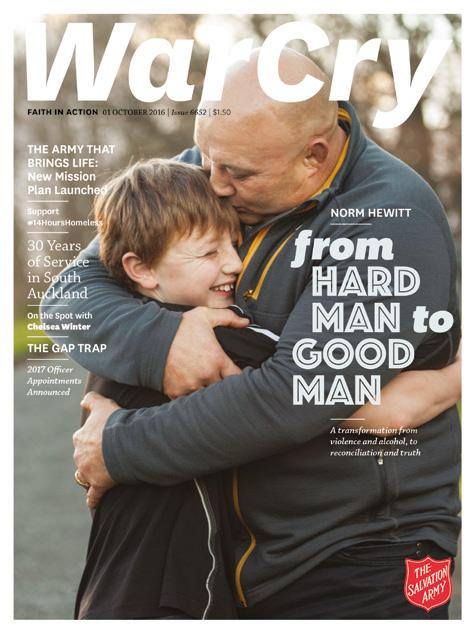
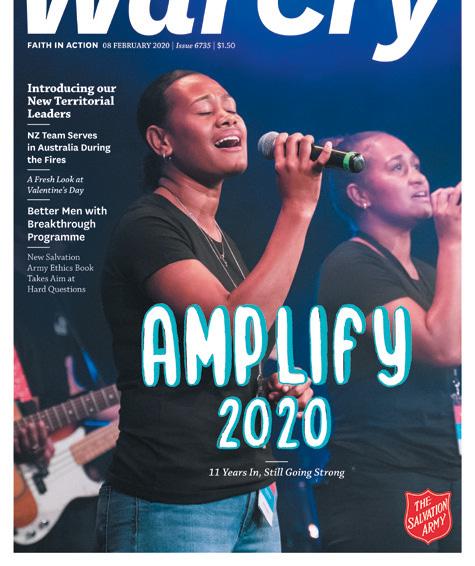
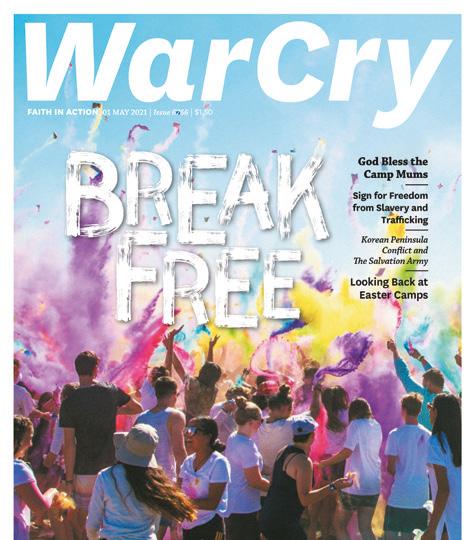
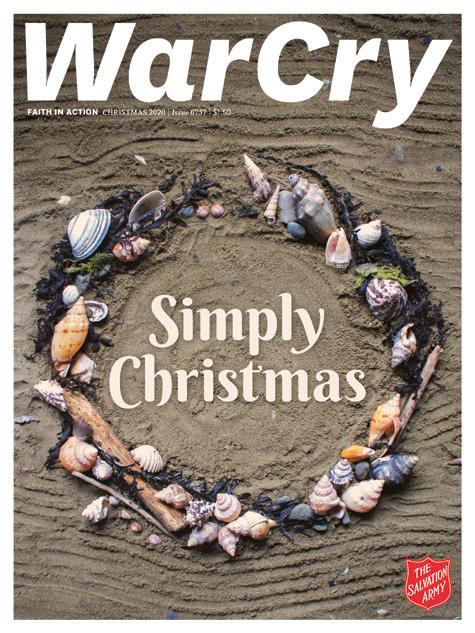
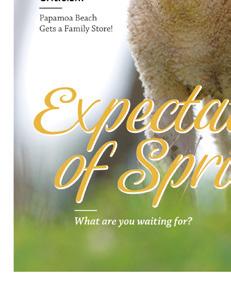








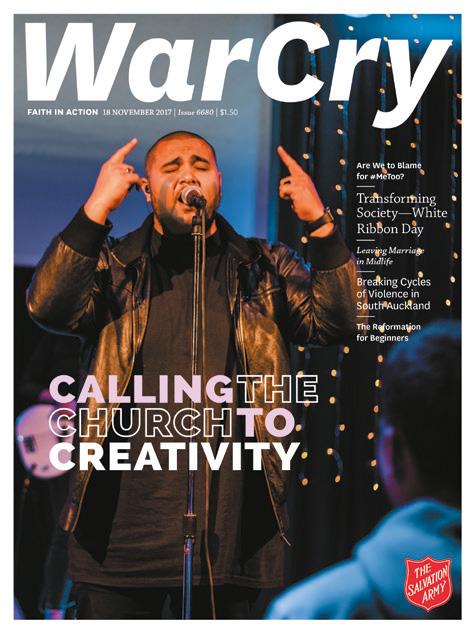

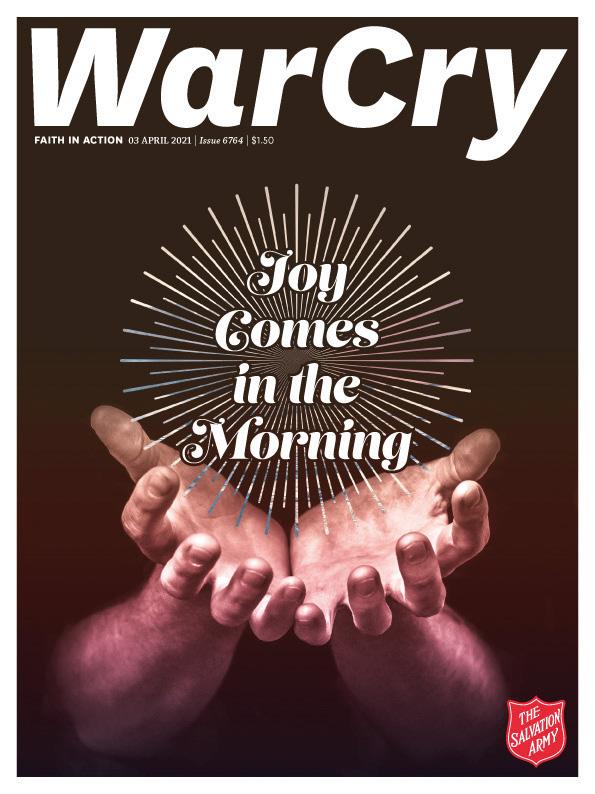
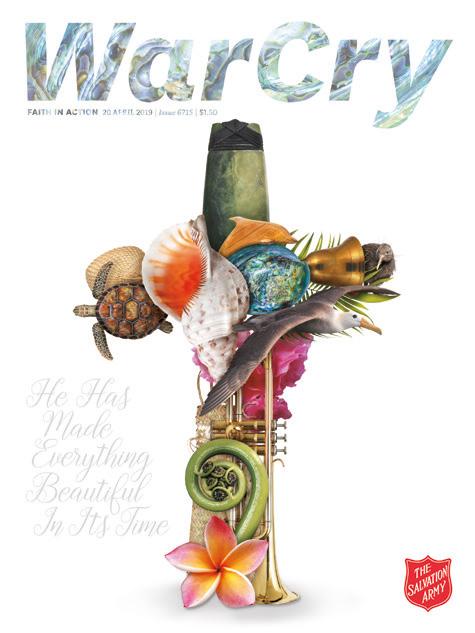



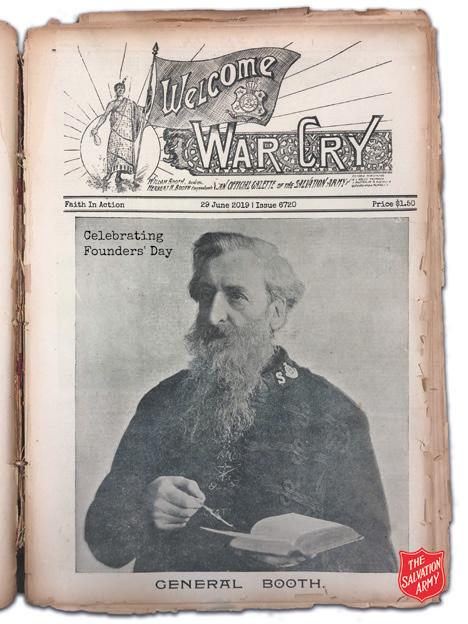

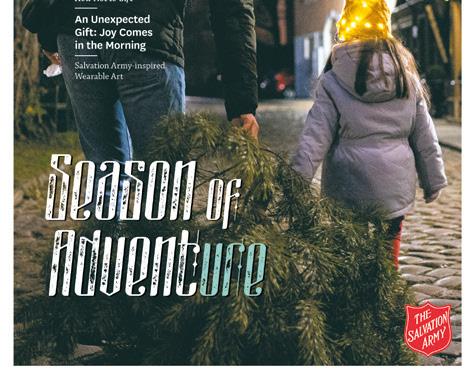
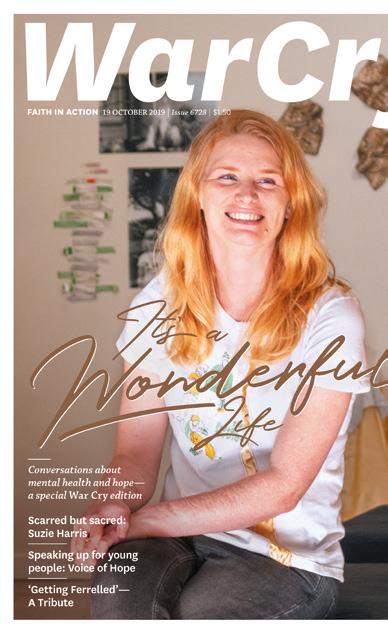





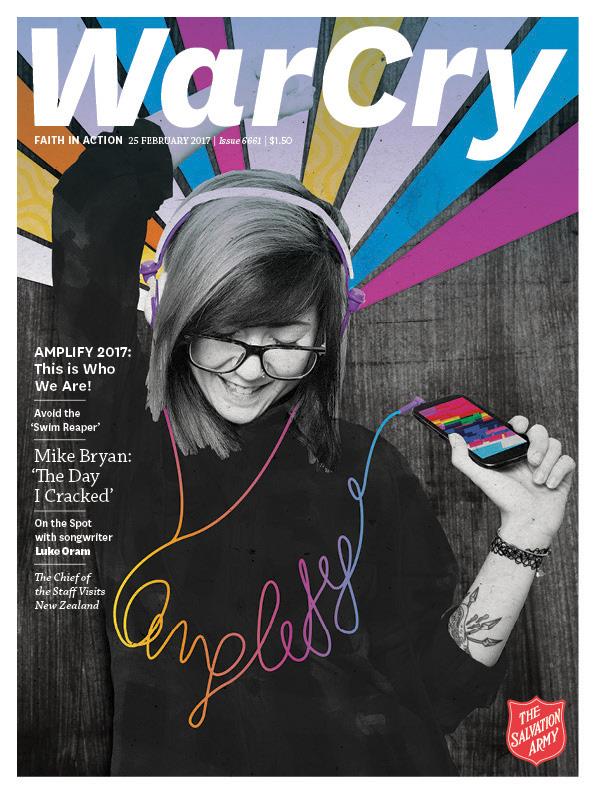


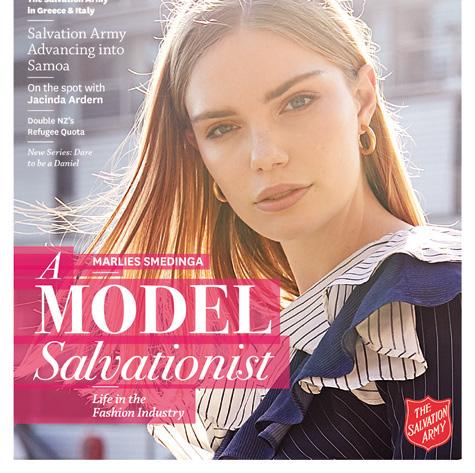

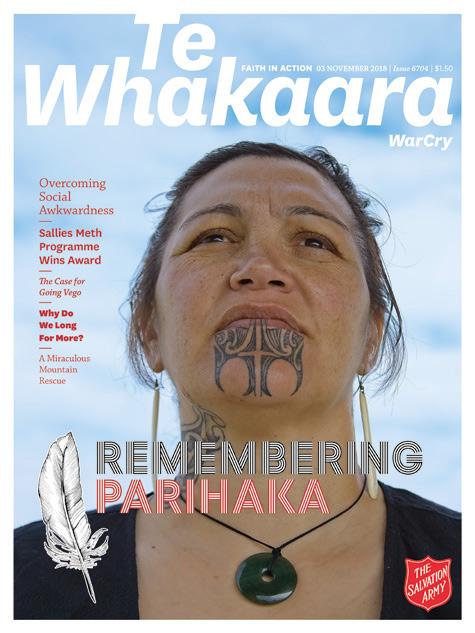
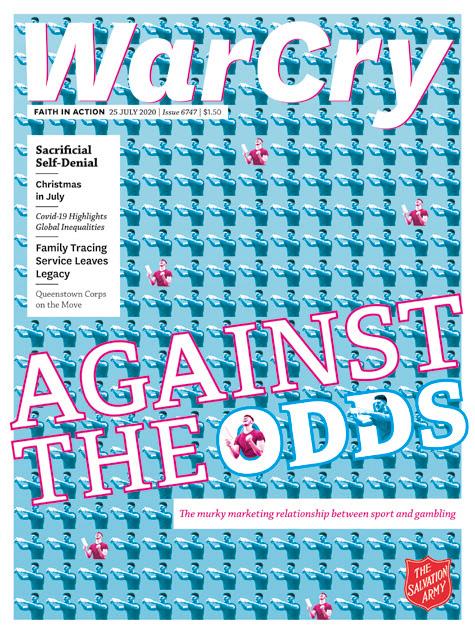





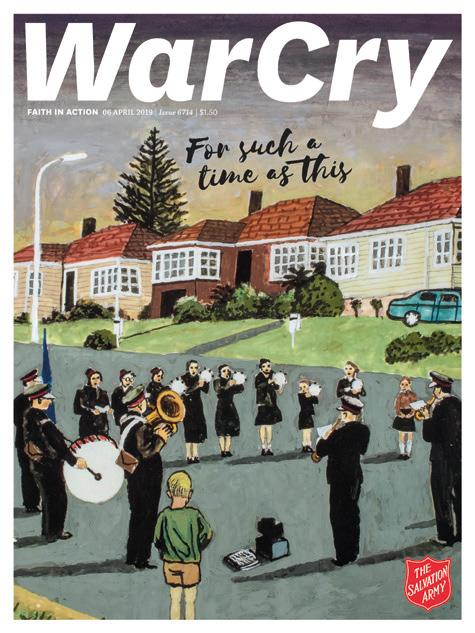


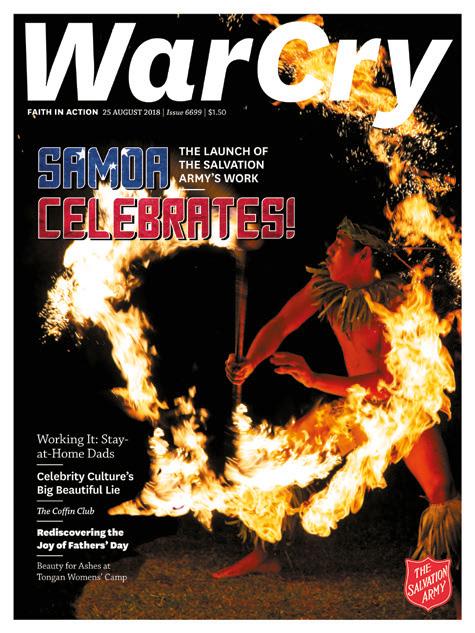
FAITH IN ACTION 01 OCTOBER 2022 | Issue 6801 | $ 1.50
PROOF READING Major Colleen Marshall OFFICE Territorial Headquarters, 204 Cuba Street, PO Box 6015, Marion Square, Wellington 6141, Phone (04) 384 5649, Email warcry@salvationarmy.org.nz, salvationarmy.org.nz/warcry

SUBSCRIPTIONS Salvationist Resources Department, Phone (04) 382 0768, Email mailorder@salvationarmy.org.nz, $75 per year within NZ
PRINT MANAGEMENT makeready.nz | PAPER Sumo Offset is an environmentally responsible paper produced using Elemental Chlorine Free (ECF) FSC® certified Mixed Source pulp from responsible sources and manufactured under the strict ISO14001 Environmental Management System.
Member of the Australasian Religious Press Association.
All Bible references from the Holy Bible, New International Version, unless otherwise stated.
Articles are copyrighted to The Salvation Army, except where indicated, and may be reprinted only with permission.
Publishing for 138 years | Issue 6801
ISSN 0043-0242 (print), ISSN 2537-7442 (online)
Please pass on or recycle this magazine
Read online issuu.com/salvationarmynzftwarcry

salvationarmy.org.nz
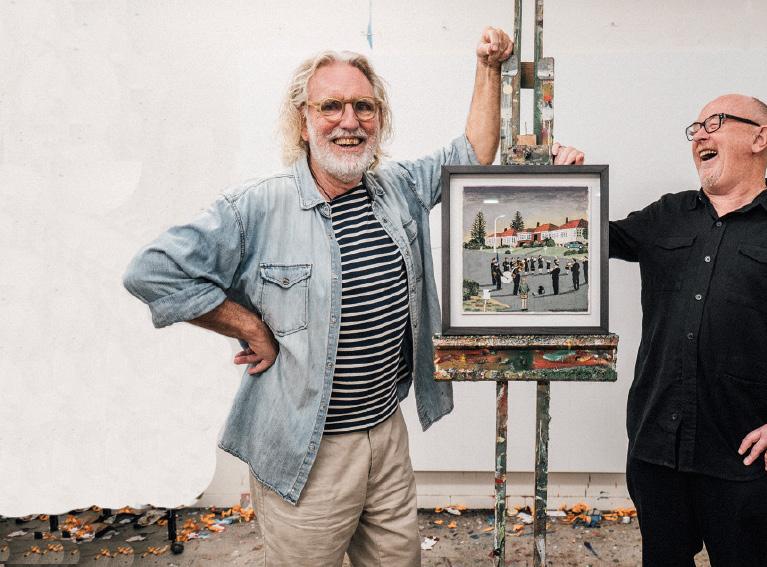
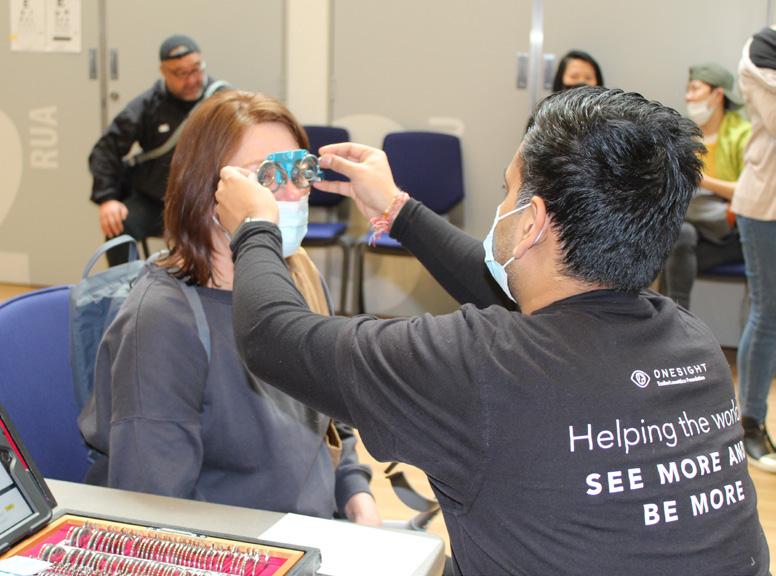
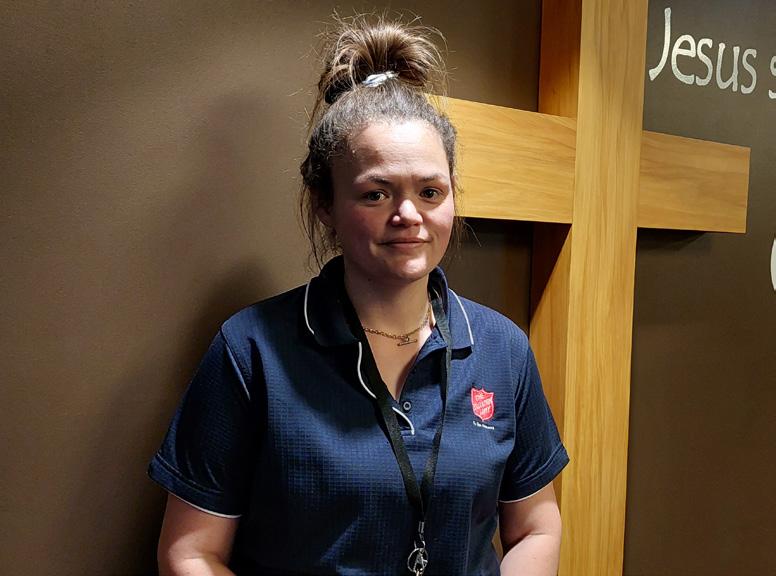
SalvationArmyNZFTS
@SalvationArmyNZ salvationarmynzfts
from 06 April 2019
War Cry Retrospective
Earlier this year, we asked for feedback on our territorial magazine, War Cry. I am thankful for the time taken by some of you to email me and the many conversations the team has had with people across our territory. You made suggestions and gave constructive feedback, which is aiding us with the decisions we are making. These discussions have gone on for two years and we are now in the final stages of redesigning and refreshing our territorial magazine.

This edition of War Cry is a look back on the past seven years and features articles previously published. We have chosen articles that we consider worthy of a second read and interspersed these with our regular content.
We are now completing the finishing touches on our new magazine. We will keep you updated as we look to roll this out across the territory. We have retained many aspects of the original magazine, but you will find new content and a new look. We are asking for increased engagement from our readers, soliciting your contributions and submissions. There will also be an increased online presence where you can access news and views as they happen across the territory.
God is unchanging—you can’t build on perfection—but he calls us to change. It is tempting to hold on to the familiar but it does not serve us well if it hampers the spreading of the gospel. We must take the opportunities that technology offers us to enhance our ability to reach people who do not know Christ. My prayer is as we look to extend our online readership and engagement, that more people will hear the good news of the gospel and come to Christ. I also hope that the new-look magazine will enable the territory to share some of the great stories that happen across our four nations every day.
Deuteronomy 33:25
The bolts of your gates will be iron and bronze, and your strength will equal your days.
Tiuteronomi 33:25 Ko ōu tūtaki he rino, he parāhi; ā ka rite tōu kaha ki ou ra.
I don't want the world to define God for me. I want the Holy Spirit to reveal God to me.
Aiden Wilson Tozer
Vivienne Hill Editor
WAR CRY
The Salvation Army New Zealand, Fiji, Tonga and Samoa Territory
TERRITORIAL LEADERS Commissioners Julie & Mark Campbell | GENERAL Brian Peddle | FOUNDERS Catherine & William Booth
The Salvation Army’s message is based on the Bible. Our ministry is motivated by love for God. Our mission is to preach the gospel of Jesus Christ and meet human need in his name without discrimination. War Cry exists to support and advance The Salvation Army’s message, ministry and mission.
EDITOR Vivienne Hill | GRAPHIC DESIGN Sam Coates, Nicole Gesmundo, Lauren Millington | STAFF WRITERS Hope Burmeister, Holly Morton, David Youngmeyer |
Reprinted
2 WarCry 01 OCTOBER 2022 20
11 04 17 06
Reprinted from 15 October 2016
Would Catherine Booth

Have Been a Suffragette?
The audience burst into spontaneous applause as the credits rolled to the movie Suffragette and New Zealand’s name appeared first on the list of countries that had given women the vote. Since we’re not a whoopin’ and a hollerin’ culture, this hints at the depth of pride we take from being the first country in the world to give women the vote. It struck me at that moment: people want to be on the right side of history.

What if I was one of the naysayers of history, I thought. Sadly, as Christians, we often fall into this trap.
I did not grow up in a feminist household. In fact, I grew up in a conservative church that didn’t believe women should speak. Despite this, the suffragettes were my first real heroes. When I was 11, our (male) teacher gave all the girls in our class a novel about the British suffragettes to read (no, the boys didn’t have to read it, but it was the ’80s, so still an inspired move). I was totally riveted by the tales of women going on hunger strikes, chaining themselves to fences and, in one case, even dying for their cause. I always remembered the name of suffrage leader Emmeline Pankhurst … even as it faded against Princess Di and Madonna.
You can teach a girl not to fight, but you can’t take the fight out of the girl. Even if you have been steeped in the art of submission, there is something so completely irresistible about a just cause that it makes you want to rise up like an avenging angel.
It’s so easy to look back a hundred years and say, ‘Yeah, of course I would have fought that cause.’ Yet there are many injustices happening right now, before our very eyes, and it begs the question: am I on the right side of history? Who needs an avenging angel at this particular moment in time?
The Salvation Army was founded in 1846, just a few years after a law was passed that banned women from voting in the UK. Both movements seem so compatible it’s strange to think that the powerhouse that was Catherine Booth would never have had the right to vote. It’s impossible to say whether Catherine would have been a suffragette. But equally impossible to think that she would not have been.
Both causes were deeply entrenched in social justice. The

movie’s main character, Maud Watts, has worked in an East London laundry since she was seven. Her mother died from scalding water at the laundry, and Maud herself is covered in scars from the boiling water. The film hints at a relationship of abuse with her boss—one she has no power to stop, since all the shame and consequence is on her. At one point in the film, Maud saves a young girl from a similar fate.
It reminded me of the young Salvation Army’s campaign against under-age prostitutes and the dire conditions in match factories. In New Zealand, the links were even closer. Our beloved Kate Sheppard became the leader of the suffrage movement because she wanted the prohibition of alcohol.
One hundred and fifty years later we can rightly be proud of The Salvation Army’s place in history—its compassion for the alcoholic and drug addict, and its care for the poor. But just as in the Booths’ day, Christianity tends towards conservatism—and we have now become part of the ‘establishment’. We enjoy a status quo that can blind us to injustices happening before our very eyes. Are we still radical enough to stand up for what’s right, even at the risk of being ostracised by our peers?
Each one of us is tainted by the injustices that surround us—the destruction of our planet, the exclusion of the LGBTIQ community, the idolisation of the body beautiful, the denial of spirituality, the tendency to put money before people … to name a few. But we all have a call to justice within us—it is the Holy Spirit.
The heart of our Christian faith is that we bring redemption to broken places. The Salvation Army is still doing that so well in the areas of addiction and social services. But the justice that the Spirit is calling you towards is your own, and will not look like anyone else’s.
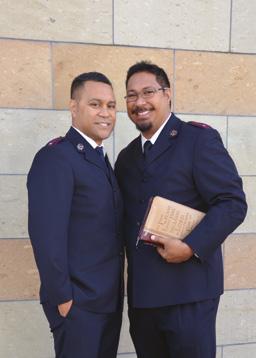
Don’t stifle that call to justice. Let us be able to say with Paul: ‘I have fought the good fight, I have finished the race, I have kept the faith’ (2 Timothy 4:7). Let us be on the right side of history!
BY INGRID BARRATT
01 OCTOBER 2022 WarCry 3
Reprinted from 23 January 2016
The Salvation Army Mourns the Queen
Commissioners Territorial leaders Mark and Julie Campbell joined thousands of other people across Aotearoa New Zealand and the Pacific to sign local books of condolence for Her Majesty Queen Elizabeth II.

Representing the territory, the Campbells attended in respect for our late Queen at the Wellington Cathedral of Saint Paul, which is located a short walk from the New Zealand Parliament.
‘We gave our condolences on behalf of the four nations in The Salvation Army New Zealand, Fiji, Tonga and Samoa Territory,’ says Mark. ‘We sent our love and support over this time, especially for the Queen’s leadership over seven decades.’
New Zealand marked the passing of Queen Elizabeth II with a State Memorial Service in Wellington and a one-off public holiday on Monday 26 September. These were chances to remember and celebrate her life and reign.
Territorial Commander for The Salvation Army in the United Kingdom and Ireland, Commissioner Anthony Cotterill, says that throughout her reign, ‘the Queen was a keen supporter of The Salvation Army and she visited our services all over the world’.
‘She regularly visited our centres and met the people we look after, including those battling drug addictions and homelessness. She opened many of our facilities, including our home for women in 1980 and numerous others around the country, always taking time to meet and talk with individuals,’ says Commissioner Cotterill.
QUIKQUIZ


1 Which state was admitted as the 49th US State in January 1959?
2 What is the study of mushrooms called?



3 Percy Spencer invented which kitchen appliance?
4 What does the U stand for in SUV?
5 Which Gospel was, according to tradition, written first?

Answers on page 22
Leadership, Young Adult Time in Timothy: Reflections on 1 Timothy for Young Leaders by Murray Brown Time in Timothy is a book written mainly for youth ministry leaders.
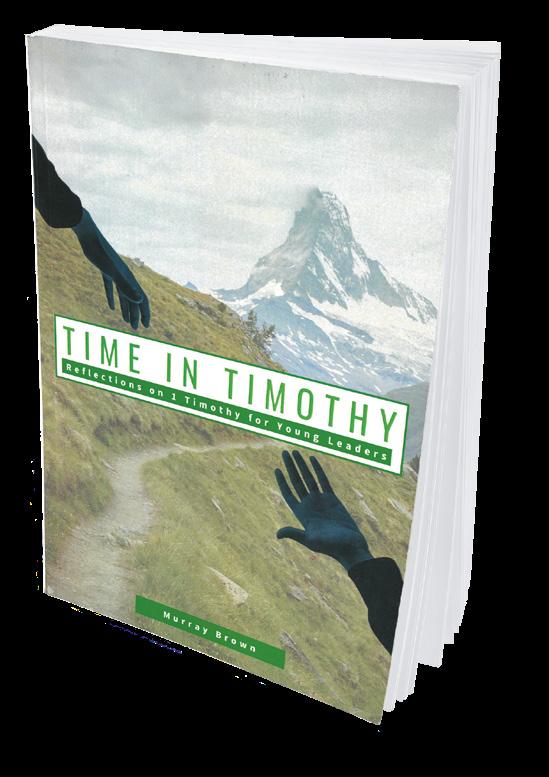


Author Murray Brown has 40 years’ experience in youth leadership and training youth leaders. He reflects on 1 Timothy’s chapters and verses, using both the cultural context and various anecdotes to explore this book of the Bible. I found there were a lot of great insights as each verse is unpacked so readers can easily digest its content. At the end, it answers questions and considers practical applications. It’s an easy read and a good resource for those who minister to youth. Murray explores a lot of important issues, such as contentment, morality, reputation and honouring leaders. It’s enough to challenge but also encourage any reader wanting to learn and deepen their capacity to serve. (Reviewed by Hope Burmeister)
Books can be ordered from: mat.badger@ salvationarmy.org.nz
Weird of the Week: Naval tradition declares submarines be called ‘boats’ rather than ‘ships’, regardless of their size.

4 WarCry 01 OCTOBER 2022
TOPFIVE
Some musicians start out with a stage name but change it for a variety of different reasons. Here are a few interesting reasons for the changes.



1. Blink-182—started out as a band called Duct Tape, which was eventually changed to Blink, with 182 added after an existing band of the same name threatened legal action.
2. Kanye West—has changed his name several times, however, his current name change is Ye, which means ‘you’ in the King James version of the Bible, keeping in line with his gospel music image.

3. Prince—changed his name to an unpronounceable symbol combining the male and female symbols, dubbed ‘the love symbol’. He began to be known as ‘the artist formerly known as Prince’.
The Dixie Chicks—removed ‘Dixie’ from their name because the 1859 song ‘Dixie’s Land’ became an anthem in support of slavery.
Jennifer Lopez
Jennifer’s first album was called ‘J.Lo’, a name she says her fans came up with. She was touched by the positive response, so she changed her name to it.
WARCRY IN HISTORY
The 13 January 1962 edition of War Cry featured an image of a Salvation Army car or ‘float’ at the Ohakune Borough Jubilee Celebrations parade. The car has boxes on the roof boldly proclaiming, ‘Jesus said, “I will come again; behold I come quickly” ’ and a large shield with ‘The Salvation Army’ on the door of the vehicle. The eye-catching float was well received and a very creative way to showcase the Army message.

Source: The Heritage Centre & Archives at the Plowman Resource Centre, Booth College of Mission.
Avocado Chocolate Tart
Base


1 cup dried pitted dates
1 cup almonds
1 cup cornflakes
1 cup desiccated coconut
Filling


250g dark chocolate
1 Tbsp coconut oil or butter
2 ripe avocados
½ cup natural yoghurt
2 Tbsp honey
Decoration
Berries or pomegranate
For the base, soak the dates in warm water for 15 minutes. Drain, discarding the water. Into a kitchen processor, place the dates, almonds, cornflakes and coconut. Blitz until it forms a dough-like texture.
Line the base of a 22cm loose-bottomed tin. Press the mixture into the base and sides of the tin. Refrigerate while you make the filling.
For the filling, melt the chocolate and coconut oil in a bowl over a pot of simmering water until smooth.
Place the avocados and chocolate mixture into the blender and blitz until smooth. Add the yoghurt and honey and blitz again until combined. Pour into your chilled base and return to the fridge.
When ready to serve, remove the tart from the tin and decorate with your favourite fruit.

Tip: You can make this vegan by swapping the honey with maple syrup, and replacing the yoghurt with a plant-based alternative, like coconut yoghurt. Just ensure the dark chocolate is vegan friendly. For a gluten-free version, use gluten-free corn flakes.
Source: countdown.co.nz
People forget facts, but they remember stories. Joseph Campbell
01 OCTOBER 2022 WarCry 5
a time as
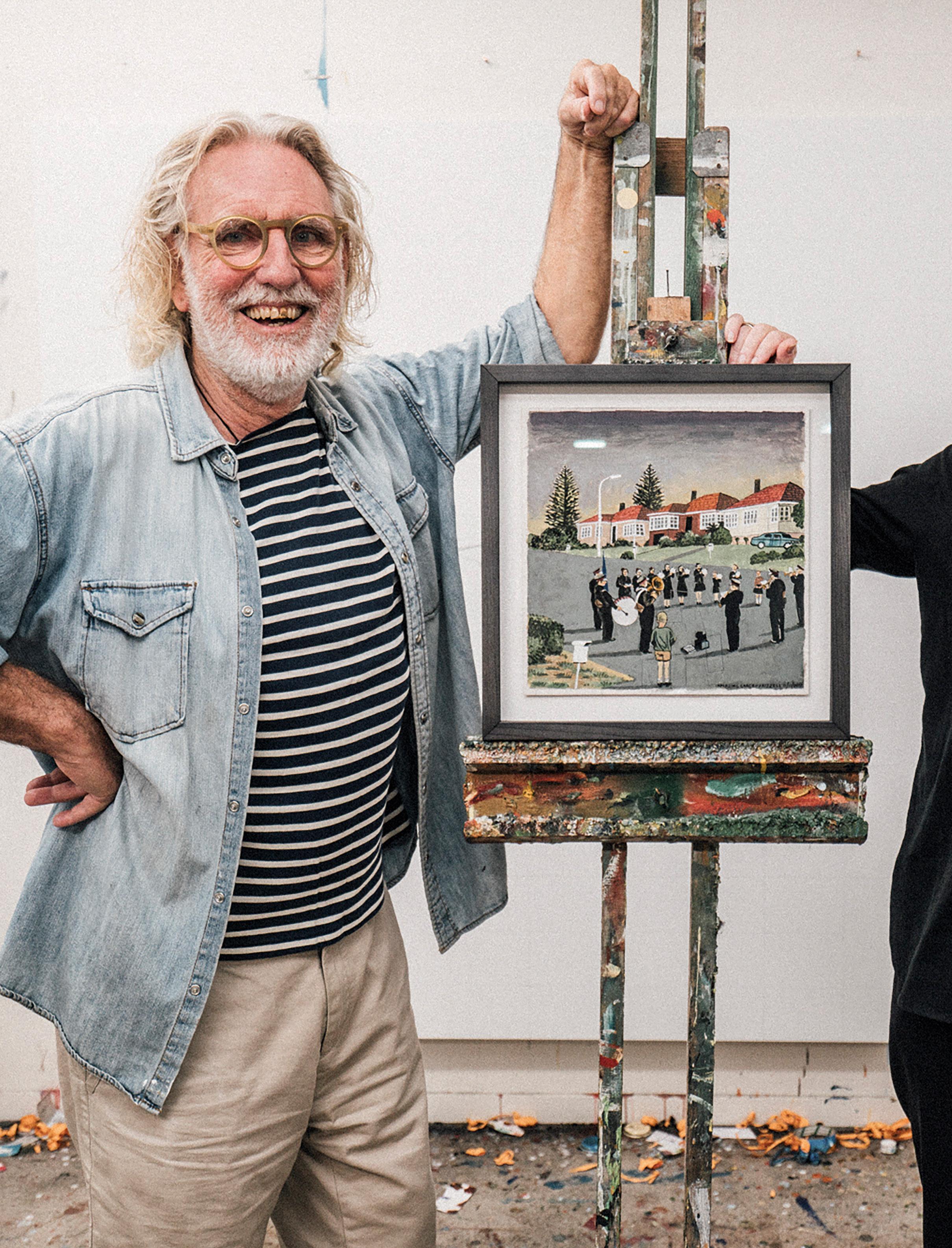
An Offering For such
this
A project that brings together ‘the artists of our time with the music of all time’ is helping our nation love and lament during our darkest days. The Offering project is a collaboration of visual and recording artists, presenting wellloved hymns—with all proceeds going to The Salvation Army.
BY INGRID BARRATT
If you have wept at memorial services around the country, or watched the news in shocked silence, you may have been comforted by the powerful presence of the hymn ‘Whakaaria Mai’, sung by well-known Kiwi artists Teeks and Hollie Smith.
This was the first single released as part of Offering, an album featuring 15 well-loved New Zealand recording artists, who breathe new life into ancient hymns—including household names like Stan Walker, Dave Dobbyn and Sol3 Mio. Each hymn has also been interpreted by a prominent New Zealand visual artist.
‘Whakaaria Mai’ (‘How Great Thou Art’) was released last week, to provide an instrument of both lamentation and comfort during our darkest days.
‘What we found when we read the lyrics of every hymn in the Offering, was they were written at a time of great adversity by the writer,’ says project creator and head of Thom Productions, Murray Thom.
He points to the much-loved hymn ‘It Is Well With My Soul,’ written by Horatio Spafford in 1873, after his four daughters died at sea. ‘We, as humans, can draw on those depths. If the writer in great despair can say, “It Is Well With My Soul” then we can draw on that and be comforted by that,’ reflects Murray.
The album has abiding significance for the Army—not only is our musical heritage at the heart of the vision, but all proceeds from both the album and paintings will go directly to fund The Salvation Army and our work with those most in need. It is an unprecedented gift to the Army, says Territorial Commander Commissioner Andy Westrupp.
‘This is such an incredible gift for the Army, and we feel so privileged that Murray and Tim [Harper] have chosen to collaborate with us. We pray that much good will come from it—both as people seek comfort during these times, and for the many New Zealanders who will be helped through the proceeds,’ says Andy.

Songs of the Spirit
It is poignant that every artist on the album chose their own hymn, paving the way for very personal—and often spiritual—journeys.
The first single, ‘Whakaaria Mai’, was chosen by Teeks as a tribute to his grandfather, who was an archdeacon in the Anglican church, and who Teeks describes as his ‘greatest role model’.
Ginny Blackmore chose ‘His Eye is on the Sparrow’, which she sang at her grandmother’s funeral. ‘It was a song that changed my life when I first heard it. When I am in glory in Heaven I will be singing it again,’ says Ginny.
Kimbra took her inspiration from the passing of Aretha Franklin, who recorded ‘Precious Lord Take my Hand’—Martin Luther King’s favourite song, which was synonymous with the civil rights movement.
One of New Zealand’s best known visual artists, Raymond Ching, has a special connection with The Salvation Army. Although retired from the public eye, he created a painting to honour his Salvationist mother. ‘Her father was
 Dick Frizzell (left) and Dave Dobbyn, in Dick’s studio sharing his work ‘Amazing Grace’. Photography: Glenn Manchester.
Reprinted from 06 April 2019
Dick Frizzell (left) and Dave Dobbyn, in Dick’s studio sharing his work ‘Amazing Grace’. Photography: Glenn Manchester.
Reprinted from 06 April 2019
01 OCTOBER 2022 WarCry 7
Reprinted from 06 April 2019
an alcoholic and his behaviour was so outrageous that it drove my mother away. She left home at 15 and joined The Salvation Army. That started her lifelong association with the Army,’ recalls Ray.
‘Some of these artists who wouldn’t call themselves “religious” have really opened their arms to this,’ reflects Murray. ‘They have brought tears to my eyes. At the end of the day, everybody’s soul needs watering and when somebody turns the tap on, you want to go and stand under it.
‘God keeps showing that he’s quite a bit bigger than we can ever comprehend and that God is for everyone.’
Offering co-creator Tim Harper, was also struck by how profound the experience was for many of the artists, whose first reaction was ‘I am not worthy’.
‘Once we gave them permission and said, “No, you are worthy”, that became the overarching message. Our artists have felt included and worthy as opposed to unworthy; they’ve felt loved as opposed to unloved, accepted as opposed to rejected. It’s a profound experience, and it has been lifechanging for some,’ says Tim.
Then he adds what is both a compliment and challenge: ‘The Salvation Army certainly treats everyone as worthy,’ he says.
A great New Zealand vision
The seed of the Offering project has been watered and nurtured for 17 years, and also proved to be deeply spiritual for both Murray and Tim.
‘I was journalling, and this word “offering” came to me,’ explains Murray. ‘I started to think about the hymns that had sustained the weary for centuries, and I thought “Wouldn’t it be amazing to have the artists of our time perform the songs of all time?” That was the genesis of the idea.’
The next day, a divine appointment brought Tim into the picture. ‘I was 23, about to begin a Masters in Nutrition, and just back from London and happened to go to Murray’s house. He shared his vision with me, and God showed me the vision so clearly—to the point that I changed my career, followed that quiet voice, and held on to it,’ explains Tim.
From the very beginning, Murray’s vision was that all funds from the project go back into helping the community. ‘I feel very, very privileged that God gave me a vision and entrusted me with that,’ he says.
Then, 10 years ago, Thom Productions shot to prominence as the creators of The Great New Zealand Songbook—an album of our country’s greatest hits from the last century and new millennium. Since then, Murray and Tim have been behind The Great New Zealand Cookbook, and a raft of other projects around the world.
The relationships with Kiwi artists developed through the Songbook , became a key that unlocked the Offering project. But they laugh that the reason it has taken 17 years for the vision to come to fruition is ‘it took us 14-and-a-half-years to realise The Salvation Army were the people we were meant to partner with’.
An act of kindness
‘I always wanted to make this album, and I always wanted proceeds to go and help people, but I didn’t have a clue how that might be,’ explains Murray.
All that changed one day during a conversation with his sister Wendy Nixon, who recalled how The Salvation Army nourished their souls during a time of great need. Her husband, Grant, was General Manager of a Christian marketing company called CMC, and worked with two young Salvationists, Bryant and Aiden Richards.
Grant had to have a fairly routine hernia operation, but things went horribly wrong leading to weeks of complications, with doctors unable to explain what had gone wrong. ‘I was facing an uncertain Christmas for my young family and very sick husband,’ recalls Wendy.
‘A couple of nights before Christmas we heard loud music outside. Out we went to investigate and were stunned to find Bryant and his Salvation Army youth group on our front lawn. They had come all the way across Auckland to bring

‘GOD KEEPS SHOWING THAT HE’S QUITE A BIT BIGGER THAN WE CAN EVER COMPREHEND AND THAT GOD IS FOR EVERYONE.’
8 WarCry 01 OCTOBER 2022
Christmas to us. In classic Salvation Army brass band style, they proceeded to play a series of wonderful Christmas carols for us. It was a gift from heaven when we needed it the most, and assured us that our Heavenly Father knew our little family was hurting,’ says Wendy.
‘Even now, many years later, it brings tears to my eyes to think about it. It is one of my life’s highlights, at a time that was definitely a low.’
As Wendy shared her story, ‘it was like the scales fell from my eyes’ recalls Murray. They realised The Salvation Army was the perfect partners for this project—both for our musical heritage, and as partners in putting funds back into our community, where it is most needed.
‘I describe it as songs that feed the soul, with proceeds that feed the poor,’ sums up Murray.
In one of the first collaborations for the Offering, almost two years ago, Dave Dobbyn lent his vocals to ‘Amazing Grace’, with a haunting and plaintive accompaniment from the Army’s Wellington Citadel Band.
Creative Ministries Director Jim Downey conducted the band for the occasion. ‘Dave talked to the band about how emotional it was for him to sing this song. It was clear in meeting Dave that he is a really passionate man and Christian, who has a real heart for the people of New Zealand,’ recalls Jim.
Much-loved artist Dick Frizzell then painted a scene that reflected Wendy’s story—with an Army band playing outside what could be any New Zealand street. It became the album cover, which will be available from 26 April.
This also sparked another idea: ask prominent New Zealand artists to interpret each of the hymns as a painting. These original works, along with 12 limited edition prints of each painting, will be available to purchase from 1 May. Again, all proceeds from these prestigious New Zealand works will go to The Salvation Army.
Every single recording and visual artist who participated in the project did so completely free of charge, and have foregone any future loyalties.
‘The fact that the proceeds were going to The Salvation Army was a huge, huge part of why everyone came on board. Pretty much everybody had a story of The Salvation Army. Moses McKay from Sol3 Mio, his dad drives a Salvation Army truck. Kimbra used to go to The Salvation Army in Melbourne every Friday night to help out. If The Salvation Army was not involved, this project would not have happened,’ says Murray.
An offering for all people
At its heart, the project is still about that single God-given word, 17 years ago: an offering.
‘It’s such an old-fashioned word, and it’s not a word that I would use,’ reflects Murray. ‘But I love the breadth of the word. When we think of an offering we think of the plate going around on Sunday morning. But I think the concept of offering is much more connected to people’s gifts and what they can offer. So many people have offered themselves to this project.
‘It’s our great delight to be making this for the country we live in and we love. The Offering project is our gift, if you will, to New Zealand. And it’s certainly the artists’ gift to New Zealand, as they have freely given their God-given talents.’
This ‘community of offering’ extends to all New Zealanders who buy the album—not only do the proceeds go to the Army, but every album comes with two CDs: one to keep, and one to give away.
Offering will be released almost 10 years to the day since The Great New Zealand Songbook. For its creators, it is a ‘full circle’ moment—at a moment in time when our nation most needs it.

‘These are songs you listen to when you want some quiet time, at a celebration like a wedding, or in mourning—like a funeral,’ sums up Tim. ‘God’s timing in this has added new depths to the offering.’
It is an offering we can all take part in, for such a time as this.
Teeks & Hollie Smith
Please note the artwork and music are no longer available. You can still listen to the recordings on Spotify, iTunes and YouTube.
01 OCTOBER 2022 WarCry 9
The Power of Stories
Most cultures have oral-storytelling traditions that transfer knowledge from one generation to the next.
Most parents want to effectively communicate their beliefs and important life-information to their children, and one way of communicating these is through telling stories; stories that not only transfer knowledge, but inspire and promote courage and faith.
Jesus understood the power of story, or parable. He knew the secret was to convey a memorable key message, not only to the audience of the day, but a message that would transcend time. The parables of 2000 years ago, still speak to us today— Jesus is the master communicator.
THE PARABLES OF 2000 YEARS AGO STILL SPEAK TO US TODAY—JESUS IS THE MASTER COMMUNICATOR.
We can now appreciate his communication style because science has finally caught up and confirmed the value of the parable, or story. A recent study analysed areas of the brain that activate as a result of storytelling. It showed that when you present information—for example, a PowerPoint presentation—the language part of the brain lights up; when you talk about food, the sensory cortex lights up; if you are talking about motion, the motor cortex lights up. But stories that involve emotion, dialogue and plot cause other parts of the brain to light up. Not only do they light up the brain of the listener, but stories synchronise the brains of the storyteller and the listener.
Try telling your child, or teen, their birth story. Communicate to them the anticipation, excitement and lead-up to their birth. Build the story to the labour and rush to hospital. Finally, the climax of the story: their arrival into the world. This simple story communicates to them a sense of acceptance, belonging and love. It is their story and informs a deep and intrinsic part with more than just information.
Problem-solving can be communicated through storytelling. Tell stories about your life challenges: how you overcame the school bully; trained and won a race; sacrificially gave. We can inspire our children to courage, generosity and expand their thinking about themselves and their actions. They will then remember stories and pass them on to their children, just like the oral traditions of ancient cultures.
EFFECTIVE STORY TELLING
Reprinted from

August
Pass on the wisdom and values you want preserved with these tips:
Key message: Identify a key message you want to convey to your child and either tell a personal story from your past, or a family member’s past. Use real-life stories. If you can’t think of any, use a Bible story.
Keep it simple: ‘Less is more’, don’t crowd out the key message with too many adjectives and adverbs. Don’t try and give too many messages in one story.
Build the story: Frame the story in your own mind before telling; build the plot, think about the ending.
What do you want them to feel? Build the emotion, the tension, the drama—engage the insula: the emotive part of the brain. This will enable your child to remember the story.

Include dialogue: Use a variety of voices. Convey short, impactful conversations.
Show, don’t tell: Instead of saying: ‘You were born and we were happy’, describe the feelings and emotions. Describe what’s happening as if the action is unfolding right at that moment.
10 WarCry 01 OCTOBER 2022
25
2018
TESTIFY!
Marise Wilson attends Hastings Corps and volunteers her time at the Family Store and children’s Ministry. She shares her journey towards Jesus through The Salvation Army and the gift of transitional housing in a time of crisis.

There was a time a few years ago when I was really struggling. I was in active addiction and I was homeless, but I managed to get into a motel. I didn’t know where I was going and had a lot of worries, not to mention that I was pregnant at the time.
I met Susan, a Salvation Army social worker, through Work and Income. Susan managed to find me some transitional housing in Flaxmere, around July of 2018. Getting that opportunity at that time I’d say was lifechanging. This connection with Susan was how I started learning more about The Salvation Army, as I was coming in quite a bit to see her and receive support each week.
Having somewhere safe to stay did millions for me. Having that foundation means you can move from there and build on other things. I wasn’t a believer when I first came into transitional housing, but I had an encounter with Jesus. That was when I started seeking the church more.
I had been having a really hard time.
I had lost my brother, and had almost lost my own life, and was still dealing with massive anxiety. When Covid-19 started, my anxiety was the worst it had ever been, but I had a friend who suggested Jesus to me. They prayed over me and from then on I became curious and started researching about who Jesus is. Because I was already in transitional housing, I just thought, I may as well start going to church
I surrendered myself to Jesus, and it was the best thing that I have done.
From then on, heaps of things just started to shift and move; old things were falling off—my drug habit came off—and new desires appeared. Before The Salvation Army, I was a wreck and very lost. Jesus has just changed my life.
I would encourage anyone to reach out to those around you if you need help. I used to think no one cared, or that I couldn’t trust anybody. It took a lot of opening up and reaching out to discover that there are people who want to help and who are there for us.
Now all I want to do is help other people like I’ve been helped, especially in situations like mine. I am working some hours at the Family Store and working in children’s ministry at the corps. It’s hard to tell people when you need support, but I’ve been making great connections with others through the corps.
It’s been a huge journey, and it hasn’t even been long, but from where I was before transitional housing to where I am now working for The Salvation Army, my life has been changed.
IT TOOK A LOT OF OPENING UP AND REACHING OUT TO DISCOVER THAT THERE ARE PEOPLE WHO WANT TO HELP AND WHO ARE THERE FOR US.
01 OCTOBER 2022 WarCry 11
BY HUGH COLLINS
CHRISTIAN ROCK WHATEVER HAPPENED
I vividly remember my first Parachute Music Festival. It was 2005 and dozens of Christian bands and artists had descended upon the Mystery Creek Events Centre to showcase their God-glorifying tunes.
Parachute was an annual Christian music festival where 20,000-plus would converge outside of Hamilton for four days of music, speakers, seminars and sunburn.
Many Christians today will tell you it was once the highlight of their calendar.
Fast-forward to March 2014 and Parachute Music CEO Mark de Jong announced that, after 23 years, the showpiece event of the New Zealand Christian community was coming to an end. Sadly, with dropping ticket sales the festival was no longer commercially viable—the 2014 event had lost close to a quarter of a million dollars.
A CULTURAL SHIFT
In an interview posted by Parachute Music, Mark said this was due not only to an increase in competition with other summer festivals but a dramatic shift in the Christian cultural landscape.
‘There was a time when mostly a Christian young person would listen to music made by Christians,’ Mark said. ‘Now our Christian young people listen to the same music that everyone else listens to. They listen to the same radio stations, they consume the same media.’
He said this had a huge impact on the festival because it meant a Christianspecific event had gradually become less appealing. On top of this, he spoke of a major shift amongst Christian musicians where many had steered towards bands with a more mainstream and secular focus.
While he believed this was a good thing,
many of those artists didn’t want to play at an event specifically tagged ‘Christian’—ultimately this meant the organisers couldn’t get many of the bands they wanted.
‘We have found ourselves in a situation where we tend to be having the same bands year after year— particularly the same international bands year after year. It’s very hard to grow an event when you’re having similar artists every year.’
Today we have Festival One, a much smaller, pareddown Christian music festival.

COULD THIS BE A GOOD THING?
Christian musician and cultural thinker Sam Burrows says ironically this change isn’t due to a stigma towards Christianity, but rather a shift in Western culture that’s becoming more open to spirituality—and, to some extent, religion.
‘This is interesting, because the height of “Christian music” as a genre and its corresponding subculture sort of emerged when this kind of coalescence [merger] wasn’t so much of an option.
‘But when people started turning to spirituality, the cultural lines started to become blurred and so it isn’t surprising that music did too.
‘Secular musicians began to discuss spirituality and God in an exploratory, rather than condescending manner, and Christian artists followed suit, far more willing to acknowledge doubt and the problems with tribal mentalities.’
Fewer musicians and songwriters are labelling and marketing themselves as ‘Christian’. But why? Is Christianity as uncool as ever? Or could this actually be a good thing?
12 firezone.co.nz 01 OCTOBER 2022
ROCK STAR?
Christian musician and Doctor of Theology Michael Frost says historically the Christian music subculture was one way of responding to the secularisation of Western society.
‘For Christians who felt uncomfortable with the way New Zealand was moving away from what they perceived to be Christian values, Christian music felt like a safe place.


‘This was a space where you could feel cool without having to go along with some of the wider changes in culture. But I think the next generation of Christians haven’t felt this same level of anxiety—probably because this new world is all they’ve known. They’re generally not so worried about some of the things that were a big deal for Christians 10 or 20 years ago.’
Christian writer Joel Heng Hartse has an interesting take on his shift from being a youth group kid who listened exclusively to Christian music. In Relevant magazine he discusses an experience he had as a teenager at a Christian rock concert—during the show the front man made it clear to the audience that the only reason they played music was to tell them how Jesus was their personal Lord and Saviour.
To Joel, this kind of attitude was brutally inauthentic. He felt lied to and cheated. After years of being a fan and buying their records they were now telling him the music didn’t matter.
‘How dare you make me fall in love with rock and roll and then tell me it’s a farce, tell me that the only reason it’s marginally OK that I’m listening to it is that behind it all is the “right thing to believe”.’
Subsequently he shunned a lot of Christian music. However, this eventually enabled him to see a different side of God. ‘This was a push I needed, a felix culpa [blessing] that would eventually open up a world in which God could be experienced in a thousand places that were not a church and a thousand songs that were not praise choruses. Once, I didn’t think such a thing was possible.’
OUTSIDE THE BOX
I feel many artists have fled the Christian label because they feel it puts them in a box—where there is an expectation about how they should approach their art. But music is art and art is expression. Why does our creativity as Christians need to be clearly confined to a single theme?
Worship music still has an important role in the church, in helping people honour and praise God through music. But Christian culture has discovered God can be worshipped in many forms and often through songs that question—much in the tradition of the Psalms. Even non-Christian artists—like Sam Smith with his song ‘Pray’—can help us understand how our wider world is relating to God. And that’s just worship through music … there are so many other ways we connect with God.
I think this shift is refreshing and exciting for the church. Ultimately it inspires our musicians to give their art a broader appeal, something which will no doubt break down the tribalism that often separates us from non-Christians. After all, I’m confident I’ve worshipped God in a range of genres—even in heavy metal!
MUSIC IS ART AND ART IS EXPRESSION. WHY DOES OUR CREATIVITY AS CHRISTIANS NEED TO BE CLEARLY CONFINED TO A SINGLE THEME?
HAPPENED TO THE Reprinted from 17 November 2018 01 OCTOBER 2022 WarCry 13
Wahine 50: We Were There …

from 07 April 2018
This month we commemorate 50 years since the Wahine disaster, which sunk on 10 April 1968, killing 51 people. Salvation Army officers Joan and Gilbert Beale were there on the day. In 2013, Joan told War Cry her story of providing hope within the horror …
My husband Gilbert and I were stationed at The Salvation Army in Lower Hutt in 1968. On 10 April, we awoke to a dreadful storm beating its fury on Wellington. It was about 1pm when news came that the Wahine was on the rocks close to Seatoun, and people were to abandon ship.
Gil jumped straight into action. Filling urns with tea and taking paper cups, he headed for Eastbourne, taking with him our son Stanley (17) and daughter Joanne (14). But we never imagined such a disaster was unfolding.

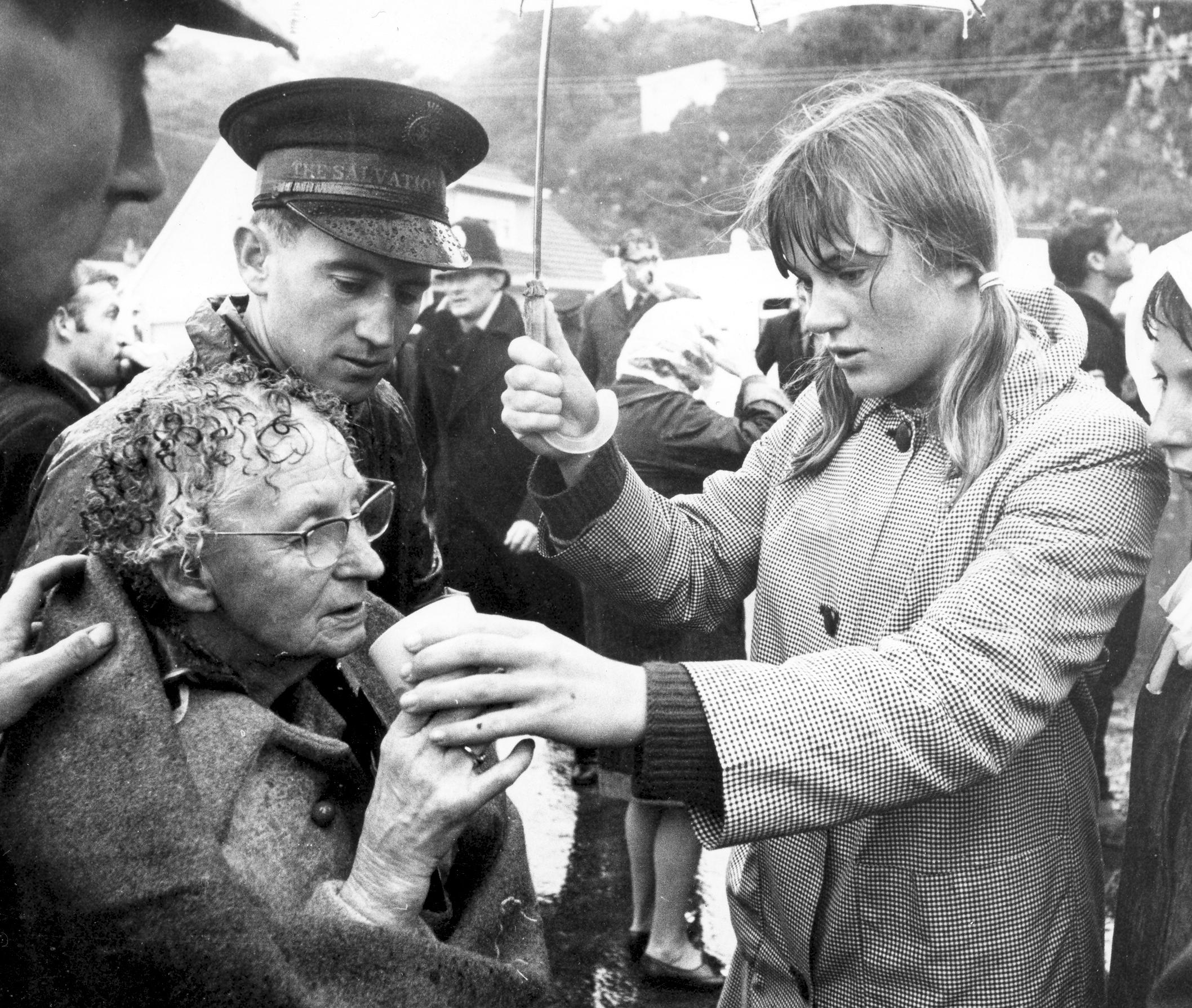
On the rocks
When they got there, they were confronted with a terrible scene. Some survivors were coming ashore in rafts, but many were swept in by huge waves that threw them against the rocks.
Stanley was asked to assist eight men who were carrying a well-built man with severe head injuries. It was quite a trek. The sea swell was so violent that one minute they could see the Wahine on its side off Seatoun, and the next they could not even see the hills around Seatoun.
Stanley was pulled away to assist back around the coast—it was here that Stanley was confronted with a body that had not yet been recovered.
Gil quickly realised this was all too much for 14-year-old Joanne to cope with, but it was too late to get her away, so he
kept her close as they gave out drinks together. When they finally got home, Joanne was a very tired, shocked and shaken girl. Our doctor prescribed tablets to settle her.
Where Stanley was I did not know. Eventually, somewhere around 7pm, he made his way to the Eastbourne RSA, where rescue workers were being coordinated and fed. Someone eventually gave him a ride home.
For the next few nights, I went to bed with Joanne wrapped in my arms.
At the hospital
Then, Gil went straight to Hutt Hospital, where he stayed all night. The superintendent immediately gave him two wards to oversee. Survivors had been dashed against the rocks—some suffering grave damage—and were rushed straight into surgery. Others were sedated and put to bed.
When I arrived at the hospital at dawn, I heard the cries, groans and yells of shocked survivors as they came out of their induced sleep. I immediately rang The Salvation Army Training College in Te Aro and asked for a vanload of cadets to be sent out. ‘Good training for them!’ I said. I divided the cadets between the two wards, telling them to go bed-by-bed and provide comfort for those that needed to talk out the horror of what they’d gone through.
Reprinted
14 WarCry 01 OCTOBER 2022
The switchboard ran hot with phone calls from anxious relatives. Gil and I undertook the task of coordinating relative pick-ups, but an urgent obstacle was that most survivors were without clothing. The force of the waves and the rocks had torn the clothes off most people.

One man had jumped overboard fully clothed in suit, shirt and tie, but after the first wave hit him, he came up with not a stitch of clothing on. Most were simply wearing hospital gowns.
Gil went straight to Hannah’s Shoe Store and asked for a quantity of large-sized soft slippers—everyone needed larger than usual sizes because their feet were swollen and feet cut from walking those rock-strewn paths in bare feet. Then it was on to a men and women’s outfitter, where he asked for large sizes of singlets and underwear. And then to our Salvation Army thrift shop for boxes of warm clothing in any and all types and sizes.
Clockwise from left: A young boy and other survivors huddle on Seatoun Beach (Dominion Post Collection/The Salvation Army Archives and Museum); Captain David Bennett assists an elderly survivor who did not know her daughter’s whereabouts— thankfully her daughter survived (Dominion Post Collection/ The Salvation Army Archives and Museum); The Wahine sinks in Wellington Harbour (Dominion Post Collection/Alexander Turnbull Library); Majors Gilbert and Joan Beale.
if they were still alive or where they might be. As we got him ready for the road, news came through that his daughters were alive. We were able to reunite them and they set about looking for the mother. In the end, Gil accompanied him to the morgue where he found his wife so badly beaten about that he could only recognise her by the rings on her fingers.
As I passed one bed, a distressed elderly man called to me. He wanted to find a little boy. The man had been standing on the deck waiting to jump when he saw a lady with a baby in her arms and a small boy. He suggested she could not manage both children and said he would take the little boy.
The boy clung tightly to the old man as they jumped. He kept saying, ‘You won’t let me go Grandad, will you?’ The pair washed ashore at Eastbourne, where the man collapsed. Again, Gil continued his work of reconnecting people. He learnt the boy had been taken to Wellington Railway Station where he was reunited with his mother and the baby after they had gone ashore at Seatoun. When the old man was told, he cried and said, ‘That little boy thought I saved his life, but I didn’t; he saved mine. The belting of those waves I could not have fought but for the little boy who clung on to me and called me Grandad. I had to keep going for him.’
Then there was the man who told Gil he had a wad of notes in the pocket of his jacket. He was heading up north to start a new life. Now, all his money was gone. Gil had one of his hunches and went down to the boiler room in the hospital where an array of sodden clothes was drying. He went through them all, and finally discovered some notes in a coat pocket. He took the soaked money home and dried it. When he returned to the gentleman, and asked how much he had lost. Gil could happily report, ‘Well I’ve found that exact amount!’
After the rescue
Gil had been on his feet for two straight days, but he met an elderly gentleman who was badly shocked and obviously ill, being put on a bus to Whanganui. ‘You cannot put that man on a bus unaccompanied in that state. I will take him,’ said Gil.
The hospital gave me the use of another room, which I set up as a clothing room. Then the work really began. A sister and nurse assisted me in washing and dressing survivors. One lady we dressed except for her feet, which were badly swollen, bruised and cut. Her feet could not take tight slippers or bandages, but needed protection. I saw a nurse with hot water bottles and asked for the covers, which I slipped on the lady’s feet. Mission accomplished! She set off home to Palmerston North.
Survivor stories
A man who had been in a tour party with his wife and two daughters, had become separated from them. He did not know
About 14 years later, I was stopped by a lady in Wellington, who recognised my Salvation Army uniform. ‘Do you know a man by the name of Major Gilbert Beale?’ she asked. ‘Yes, I do,’ was my reply.
‘He saved my father’s life. Dad would never have made the journey back to Whanganui if it had not been for his care.’ I then told her that I was Gilbert Beale’s wife and would gladly convey their thanks to him.
Since writing this account, Majors Gilbert and Joan Beale have been promoted to Glory—but their legacy lives on. This article is an abridged reprint from War Cry 20 April 2013. For the full story go to salvationarmy.org/our-community

YOU WON’T LET ME GO GRANDAD, WILL YOU?
01 OCTOBER 2022 WarCry 15
Hamilton City Launches Social Supermarket
An innovative approach to addressing emergency food needs has been launched in Hamilton, promising a more dignified, empowering and educational experience than traditional foodbanks.
Around 50 people gathered at the Hamilton City Corps in August to mark the official opening of the social supermarket, which will increasingly take over from the traditional foodbank service in Hamilton.
Among the guests were Hamilton City Councillor Rob Pascoe and Jono Bell, The Salvation Army’s territorial director of Community Ministries.
Rob Pascoe told the audience that cost-of-living increases are putting real pressure on families. He thanked The Salvation Army for the work they are doing with the social supermarket as well as the other suite of social services they provide to the community.
In his remarks, Jono said that The Salvation Army is absolutely committed to eradicating poverty, and that everybody deserves the dignity of being able to access their own food.
Compared to traditional foodbanks, the social supermarket involves a high element of choice. Individuals and families make an online booking to meet with a welfare assessor. While waiting their turn, they can relax with a hot drink in a pleasant lounge-like space.
The welfare assessor gets to know their situation and, if food is a need, assigns them a number of points to be used for shopping.
A personal shopper accompanies them into the supermarket, answering any questions along the way and recording their purchases. It is up to the individual or family as to what food and other items they want, depending on how many points they have available.
‘Food that is high in nutritional value, like fruit and vegetables, costs fewer points than less healthy options,’ says Community Development Manager Aimee Kipara. ‘The visit to the social supermarket not only provides choice … but also becomes an exercise in budgeting.’
Recipes are available to provide ideas on how to use various ingredients to make a meal.
‘Going forward, we plan to produce our own cooking videos, which will be linked to recipes by QR codes, as well as running cooking classes,’ says Foodbank Coordinator Raewyn Tong.
The social supermarket has been operating as a pilot for the past several months, with a small number of families providing their feedback and processes being fine tuned.

‘We’ve received very positive feedback from our early users, with some being overwhelmed by the opportunity to choose what they want,’ says Aimee.
‘It’s never easy reaching out for help, but we hope the social supermarket will be an empowering and uplifting experience for individuals and families who come to us for help and support.
‘We’d like to say thank you to everyone who has helped to bring this project to fruition. It’s all about making a difference for people most in need in our community.’
Hamilton City Community Ministries will continue to operate their other foodbank services, which include Covid-19related services, such as food parcels for people isolating and a drive-through service; along with supporting foodbanks in the wider region with bulk supplies.
Social Justice Conference
The Salvation Army took part in a recent national social justice conference in Auckland, presenting on a panel and providing information about our advocacy work.
An estimated 700 people attended The Justice Conference, which took place on 3 September with the theme ‘Lift Up Your Voice’.
The conference was hosted by Tearfund NZ in partnership with other organisations, and provided a forum for Christian perspectives on a range of social justice-related issues.
The conference involved four streams: the voice of humanity, the voice of creation, the voice of Scripture and the voice of the Church.
Salvation Army Social Policy and Parliamentary Unit Director Lt-Colonel Ian Hutson spoke as part of a panel on ‘Everyday justice in Aotearoa’. The other panellists were from Visionwest
and Christians Against Poverty, while a representative of Tearfund NZ facilitated.
The panel explored the important issues of inequity and injustice in Aotearoa New Zealand. They discussed topics such as alcohol reform, the cost of living, food insecurity and housing. The session included the opportunity for audience members to pose their own questions.
The Salvation Army also ran a stall at the conference, which aimed to educate participants about what we do.
‘The stall was a great opportunity to engage with a diverse range of people about The Salvation Army’s work in the community,’ says Mariana Esquivel-Pena, office manager for the Social Policy and Parliamentary Unit.
The Justice Conference—which has been operating in New Zealand since 2016—originally began in the United States in 2010.
16 WarCry 01 OCTOBER 2022
Focus on Mental Health and Wellbeing
The importance of mental health and wellbeing following on from the years of the pandemic is the focus of two closely occurring awareness campaigns.
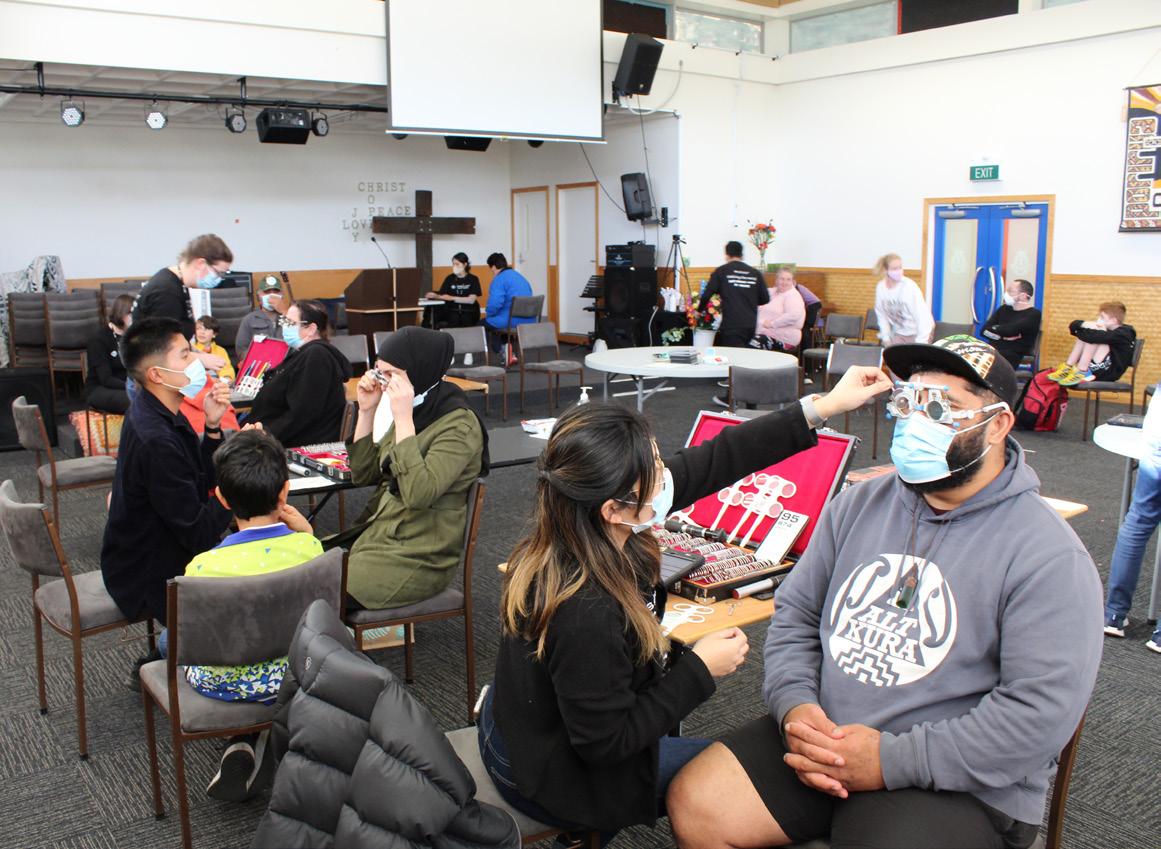
The annual Mental Health Awareness Week is run in New Zealand by the Mental Health Foundation (MHF) from 26 September to 2 October.
The campaign is about reconnection following the isolation experienced by many over the years of the pandemic. Under the theme ‘Reconnect—with the people and places that lift you up’, the campaign acknowledges it has been tough and that it is easy to feel disconnected from the people and places that are important to us.
The campaign website contains a variety of information and resources, along with details about activities around the country.
The annual World Mental Health Day—a global campaign run by the World Health Organisation (WHO)—will be marked
OneSight Eye Clinics 2022 in View
In early September, hundreds of people from five communities across the Central Division flooded into our centres to participate in a life-changing partnership with the OneSight EssilorLuxottica Foundation, addressing the needs of one in three people who struggle with uncorrected, poor vision.
The Salvation Army is fortunate to partner with OneSight to provide two week free long eye-care clinics each year. The generosity of OneSight offers optometrist services for many in our country whose eyesight issues are financially out of their reach to remedy.
The teams of experienced optometrists and eyewear specialists came from both Australia and New Zealand, and were given a week by their company to run eye clinics across five locations: Lower Hutt, Upper Hutt, Palmerston North, Porirua and Wellington. They saw around 600 people and each person received an eye test, lens prescriptions, and in some cases eyewear, which they could take on the day.
Many of the people who attended the clinics have lived with poor vision their whole lives and have never been able to read or participate in everyday activities. One participant’s poor eyesight excluded him from being able to see the details of the world around him. He put on the test frames and promptly started crying. The team took him over to the window to look outside and he exclaimed, ‘I can see the rooftops! And look, there are the birds!’ He came in weighed down by life, but he walked out the doors with a win that he thought was out of his reach.
The partnership has helped over 6000 people over 10 years and provides over $1.5 million in eye care and eyewear for those we care for. The Salvation Army through its partnership with OneSight hopes to offer access to sustainable eye care for many more Kiwi in the years to come.
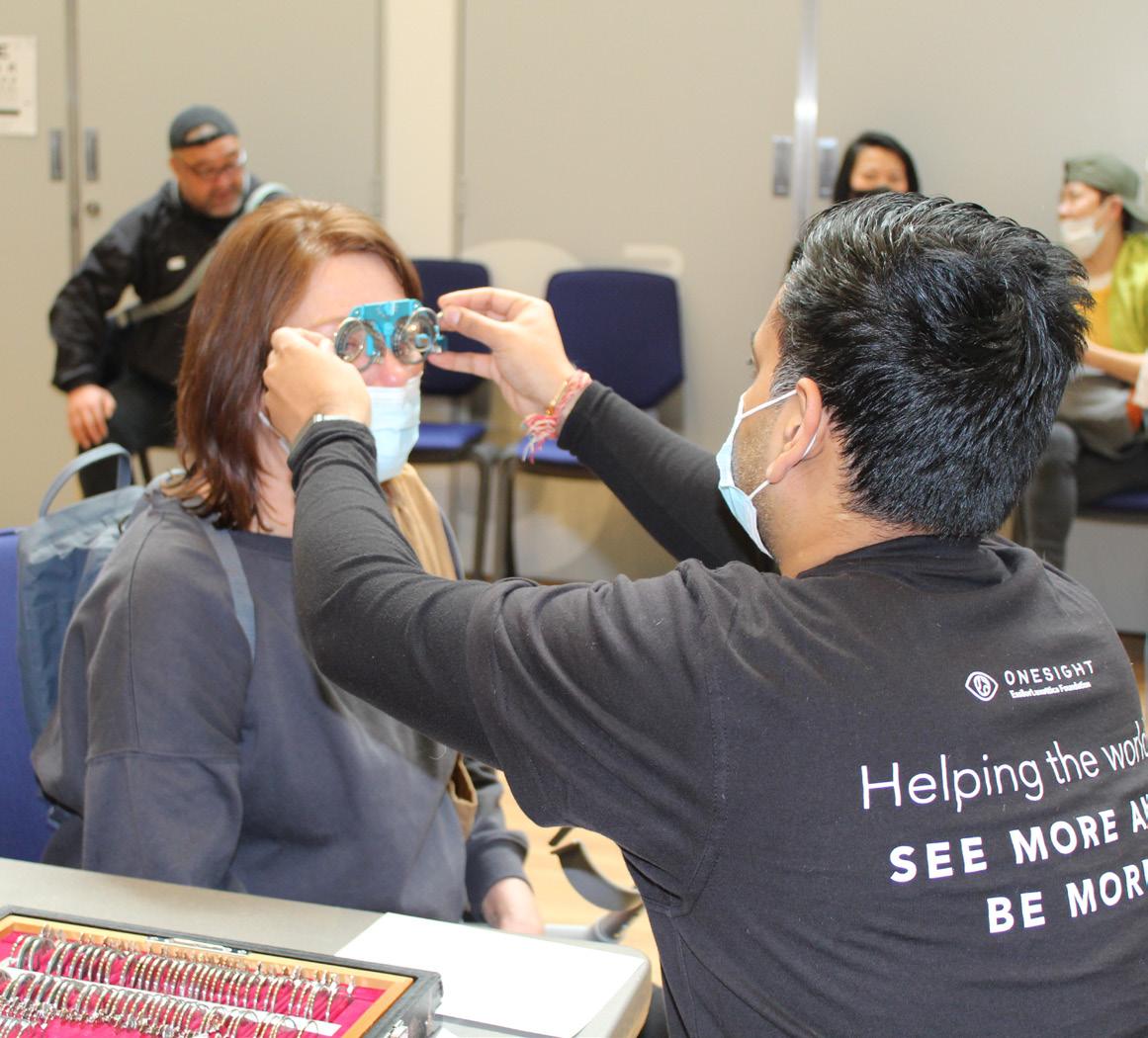
on 10 October. The theme of the WHO campaign: ‘Making Mental Health and Well-Being for All a Global Priority.’
According to the WHO website: ‘Whilst the pandemic has, and continues to take its toll on our mental health, the ability to reconnect through World Mental Health Day 2022 will provide us with an opportunity to re-kindle our efforts to protect and improve mental health.’
WHO points to global estimates that put the rise in both anxiety and depressive disorders at more than 25 percent during the first year of the pandemic. At the same time, mental health services were severely disrupted and the treatment gap for mental health conditions widened, WHO notes.
More information: Visit Mental Health Awareness Week mhaw.nz and World Health Organisation who.int
01 OCTOBER 2022 WarCry 17
GAZETTE
Birth: Lieutenant Jesse Willis gave birth to a baby girl, Madison Jessica Willis. Madison was born at 2.57am on Sunday 4 September 2022, weighing 8lb 15oz (4.055kgs). May God bless Lieutenants Ben and Jesse Willis as they welcome Madison into their family.
First Time Grandparents: Congratulations are extended to Captains Christine and Karl Foreman on the safe arrival of their first grandchild, Madison Jessica Willis.
Reserved Appointment: Effective immediately, Major Raewyn Gardner has been appointed as Divisional Commander (pro tem) for Midland Division.
Long Service Recognition: Effective 4 September 2022, we congratulate Major Louisa Raico on attaining her Long Service Award for 25 years of service.
Promotion: Effective 8 August 2022, Captains Akesa Mosa’a and Petuliki Mosa’ati have been promoted to Major.
Name Change: Effective 1 October 2022, Wellington City Corps will be changing its name to The Salvation Army, Cuba Street. Additionally, Captains Daniel and Juanita Buckingham’s appointment title will change to Mission Officers, The Salvation Army, Cuba Street.
Bereavement: Captain Raechal Leha, of her father Robert Krishna, who passed away on 12 September 2022, aged 77 years. We ask you to uphold in prayer Captains Faleata and Raechal Leha, and their extended family at this time of grief and loss.
ANNUAL GENERAL CHANGE
Effective 12 January 2023
Territorial Headquarters Personnel Section: Captain Shane Healey, Territorial Candidates Secretary (based in Christchurch); to be advised, Territorial Personnel Support Officer; To be advised, Personnel Projects & Research Officer.
Mission Section: Major Raewyn Gardner, Senior Mission Support Officer; Captain Sarah Healey, Executive Officers, National Youth Band (additional appointment); Captain Shane Healey, to be advised; Covered by BMAC Manager, Chaplain, Blue Mountain Adventure Centre; Major Garth Stevenson, Chairperson, Moral and Social Issues (Ethics) Council [additional appointment]; Captain Emma Howan, Deputy Chairperson, Moral and Social Issues (Ethics) Council [additional appointment].
Communications Section: Captain Rachel Montgomery, War Cry/ Communications Writer (additional appointment).
Strategy Development and Risk: Major Linda Bateman, Assistant Territorial Auditor.
Booth College Of Mission
School For Officer Training, Upper Hutt: Major Katherine Sonntag, Mission Training Officer (additional appointment).
School For Officer Training, Fiji: Major Merewalesi Qoriniasi, Mission Training Officer; Captain Shiv Ram, Training Officer. Addictions, Supportive Housing and Reintegration Services Cadet Tammy Mohi, Mission Officer Addington, Addington Christchurch Supportive Housing (Cadet Tammy Mohi will take up her appointment with the rank of Lieutenant following her commissioning on 10 December 2022 as part of the Reflectors of Holiness—Ngā Kaiwhakaata i te Tapu session).
Northern Division, Auckland Area Pilot and Northland Area Pilot Major Anne Irwin, Personnel Officer (pro tem) [additional appointment]; Cadet Alana LePine, Youth Officer and Candidates Officer (Cadet Alana LePine will take up her appointment with the rank of Lieutenant following her commissioning on 10 December 2022 as part of the Reflectors of Holiness—Ngā Kaiwhakaata i te Tapu session); Major Miriama Simanu, Associate Corps Officer, Auckland City Corps; to be advised, Flat Bush Plant; Captain Ted (Tae Hwan) Kim and Captain Aram Kwon, Corps Officers, Glenfield Corps and Directors, Glenfield Community Ministries—North Shore
Service Hub; Cadet Nicholas Moffat and Cadet Rebecca Moffat, Corps Officers, Pukekohe Corps (Cadets Nicholas and Rebecca Moffat will take up their appointments with the rank of Lieutenant following their commissioning on 10 December 2022 as part of the Reflectors of Holiness—Ngā Kaiwhakaata i te Tapu session); Lieutenant Charlene Whybrow and Lieutenant Jonathan Whybrow, Corps Mission Officers, Whangārei Corps (as part of the Whangārei Corps Team Ministry).
Midland Division
Captain Stuart Tong, Divisional Commander (Divisional Leader); Captain Kylie Tong, Divisional Leader and Divisional Secretary for Personnel; to be advised, Divisional Secretary for Women’s Ministries and Divisional Silver Star Secretary & Divisional Missionary Fellowship Secretary; no replacement, Divisional Secretary for Mission; employee position, Divisional Director of Community Ministries; Major Geraldine Johnson, Divisional Secretary for Retired Officers (appointment in retirement); Cadet Benjamin Cola, Corps Officer, Cambridge Corps (Cadet Benjamin Cola will take up his appointment with the rank of Lieutenant following his commissioning on 10 December 2022 as part of the Reflectors of Holiness—Ngā Kaiwhakaata i te Tapu Session); Captain Mere Gina Gataurua and Captain Saimone Gataurua, Corps Officers, Napier Corps and Directors, Napier Community Ministries; Captain Jessica Bezzant and Captain Nathan Bezzant, Corps Officers, Taupō Corps and Directors, Taupō Community Ministries.
Central Division
Major Allan Bateman, Divisional Secretary for Personnel; no replacement, Second in Charge, Divisional Secretary for Mission and Assistant Divisional Secretary for Mission; Captain Juanita Buckingham, Divisional Candidates Secretary (additional appointment); Lt-Colonel Margaret Bateman, Divisional Missionary Fellowship Secretary (additional appointment); Major Brenton Millar and Captain Samantha Millar, Corps Officers, Palmerston North Corps and Directors, Palmerston North Community Ministries; Captain Annette Bray, Corps Officer, Tawa Corps; Captain Perry Bray, Assistant Corps Officer, Tawa Corps; Captain Rachel Montgomery and Captain Simon Montgomery, Corps Officers, Whanganui Corps.
Southern Division
Captain Shane Healey, Divisional Secretary for Personnel; Captain Sarah Healey, Divisional Secretary for Mission; Major Susanne Prattley, Divisional Secretary for Silver Star (additional appointment in retirement); Captain Phillipa van Abs, Divisional Spiritual Life Development & Prayer Coordinator (additional appointment); Lieutenant Aimee Noakes and Lieutenant Scott Noakes, Corps Officers, Christchurch City Corps and Directors, Christchurch City Community Ministries; under divisional oversight, Gore Corps; Captain Jocelyn Smith and Captain Paul Smith, Corps Officers, Oamaru Corps; Cadet Barry Kirby and Cadet Natalie Kirby, Corps Officers, Rangiora Corps (Cadets Barry and Natalie Kirby will take up their appointments with the rank of Lieutenant following their commissioning on 10 December 2022 as part of the Reflectors of Holiness—Ngā Kaiwhakaata i te Tapu session); Captain Bradley Carpenter and Captain Fleur Carpenter, Corps Officers, Sydenham Corps and Directors, Sydenham Community Ministries (as re-accepted officers).
Fiji Division
Major Adrian Marika Serevi, Divisional Secretary of Officer Coaching & Reviews and Divisional Secretary of Men’s Ministries (additional appointments); Lieutenant Mereani Betena, Associate Corps Officer, Lautoka Corps and Chaplain, Lautoka Family Care Centre; Cadet Sailosi Laliqavoka and Cadet Salaseini Laliqavoka, Corps Officers, Lomaivuna Corps (Cadets Sailosi and Salaseini Laliqavoka will take up their appointments with the rank of Lieutenant following their commissioning on 26 November 2022 as part of the Reflectors of Holiness Session); Cadet Maritina Yavala and Cadet Petero Yavala, Corps Officers, Nadi Corps and Chaplains, Nadi Airport (Cadets Maritina and Petero Yavala will take up their appointments with the rank of Lieutenant following their commissioning on 26 November 2022 as part of the Reflectors of Holiness session); Major Arone Cheer and
18 WarCry 01 OCTOBER 2022
Major Tauantabo Cheer, Team Leaders, Nasinu/Nausori Corridor (additional appointment); Major Tevita Lewetuitovo, Team Ministry Officer, Nasinu/ Nausori Corridor; Cadet Akuila Tuinaceva and Cadet Bale Tuinaceva, Corps Officers, Sigatoka Corps (Cadets Akuila and Bale Tuinaceva will take up their appointments with the rank of Lieutenant following their commissioning on 26 November 2022 as part of the Reflectors of Holiness session); Captain Shiv Ram and Captain Taburerei Ram, Corps Officers, Suva Central Corps; Captain Ruci Napolioni and Captain Seru Napolioni, Associate Corps Officers/Ministry Extension Officers, Suva Central Corps; Major Kesoni Qoriniasi, Assistant Court and Correction Services Officer/Chaplain.
Tonga Region
Major ‘Asena Sifa-Folau, Regional Secretary for Women’s Ministries, Community Ministries Officer and Chaplain, Pea Kindergarten; Captain Raechal Leha, Cross-Cultural Development Officer and Regional Spiritual Life Development & Prayer Coordinator; Captain Faleata Leha, Regional Projects Officer and Emergency Services Coordinator; Major ‘Ana Vaea and Major Frederick Vaea, Corps Officers, Fua’amotu Corps; Cadet Meleseini Otainao, Corps Plant Officer, Kolovai Corps Plant and Chaplain, Kolovai Kindergarten; Cadet Peter Otainao, Corps Plant Officer, Kolovai Corps Plant (Cadets Meleseini and Peter Otainao will take up their appointments with the rank of Lieutenant following their commissioning on 26 November 2022 as part of the Reflectors of Holiness session); Major Malia Siufanga and Major Sila Siufanga, Corps Officers, Vaini Corps.
Samoa Region
Captain Julie Turner, Regional Spiritual Life Development & Prayer Coordinator (additional appointment); Major Afolau Toluono, Assistant Officer, Apia Corps and Community Ministries.
Officer Awaiting Appointment: Major Nigel De Maine.
Officer Returning to Home Territory: Major Lai Li will be returning to the Australia Territory.
Officers Concluding Appointments in Retirement at General Change: Colonel Heather Rodwell; Major Ruth Froggatt; Major Margaret Ousey; Captain Lindsay Andrews.
Officers Retiring: Major Glenys Fairhurst; Major Paul Jarvis; Major Susan Jarvis We pray that God will bless and prepare all of these leaders in the days ahead.
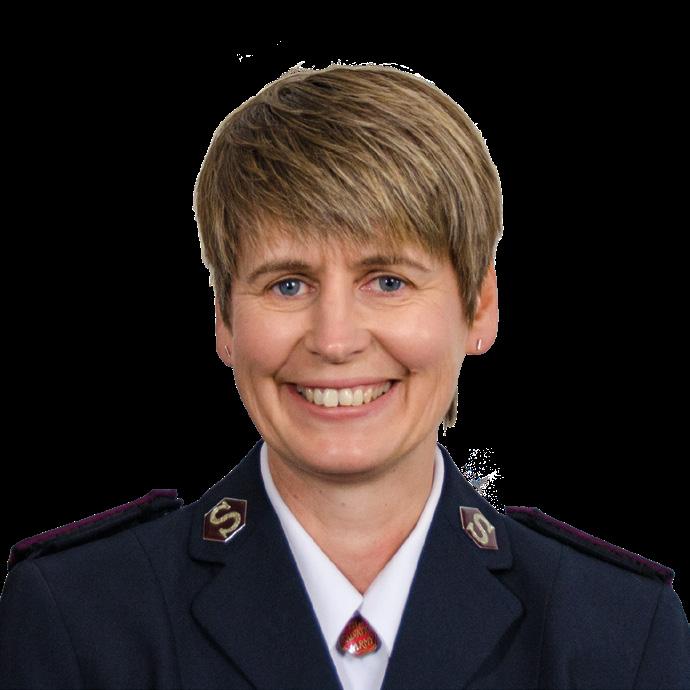
A LIFE OF SACRIFICIAL SERVICE TO GOD AND OTHERS.
As I write this, the world is mourning the passing of Her Majesty Queen Elizabeth II. I have taken in the considerable reflection and commentary on her incredible life of service; for 70 years she served her people and in doing so demonstrated great commitment, perseverance and sacrifice.
The outpouring of tributes and messages has affirmed her strong faith in God; a faith that was evident throughout her life and was the foundation on which she stood firm, both in times of joy and challenge. Her example has impacted our world, possibly more than most had realised. And while much of this dedicated service was done in the public eye with the world watching on, I believe there was much more that went on behind the scenes that we did not have the privilege of observing.
As I consider the Queen’s rich legacy, I am reminded of a recent visit to a corps where I spent several years as I was growing up. I enjoyed meeting and reminiscing with people and seeing many familiar faces. One familiar face was my Sunday school teacher from years ago. We talked about those days and the impact she had on me. We also talked of her committed service every week—how grateful I am for this dedication.
Later that day I watched her serve in the kitchen, cleaning up until everything was done and in its right place. Perhaps slower now, but thirty-five years on there is still a commitment to sacrificial service to God and to others. I was deeply moved and privileged to witness this act of love, which has been and continues to be outworked over a lifetime, both in times of joy and in the more challenging times.
It is people like my Sunday School teacher who are the backbone of The Salvation Army. These people are found throughout the territory in our corps and centres. I am so thankful and humbled by such commitment. Much of this sacrificial service goes unnoticed and may even seem insignificant, but please let me assure you that this service is unequivocally significant.
God has called each of us to work for him. We are created in Christ Jesus to do good works (Ephesians 2:10). More than that, it is an act of worship: ‘Therefore, I urge you, brothers and sisters, in view of God’s mercy, to offer your bodies as a living sacrifice, holy and pleasing to God—this is your true and proper worship’ (Romans 12:1).
Whether seen or unseen, applauded by the world or hidden away in the kitchens, our sacrificial service is significant and known to God; a God who loves us, and rejoices in our worship. The full impact of our service may never be recognised, but it is my prayer that as with the Queen, we and others will be able to testify that it has been our faith in God and our response to his great mercy that has empowered our commitment to sacrificial living. May God bless each of you as you continue to live sacrificial lives, holy and pleasing to God.
Captain Pauleen Richards Territorial Secretary for Personnel
01 OCTOBER 2022 WarCry 19
Reprinted from 15 October 2016

THE SALVATION ARMY IS APOLITICAL NOT
even by Salvationists. On the contrary, our co-founder William Booth was keenly interested in politics because he was keenly interested in people. The word ‘politics’ has its origins in the word polis meaning the ‘life of the city’. If politics is about living together in community then all of life is political. For William Booth, engaging with political issues made sense because it was a key means to address people’s needs and seek to bring about social justice and wellbeing.
Said Booth: Our work is to deliver people by turning them away from the iniquities. That is a fundamental principle. But we want help in that matter from the government. We want our lawmakers to make just laws …
Politically non-partisan
The Salvation Army is a politically nonpartisan movement. Our International Positional Statement on The Salvation Army and the State declares:
Although (The Salvation Army) seeks to influence governmental and public affairs, it will not promote or endorse specific candidates or political parties. In working with any State or its agencies, The Salvation Army seeks to promote biblical values, including justice, truth, mercy, equity, human rights and peace, as part of its religious convictions and practice.
Exploring the non-partisan nature of The Salvation Army’s engagement in the public sphere. What place does politics have in a life of faith?
BY SUSAN HOWAN
Local body elections have just been held across New Zealand. We’ve seen billboards at every intersection, and our letterboxes have overflowed with pamphlets proclaiming the policies and merit of the candidates. It makes you
think: what place does politics have in a life of faith?
Some people consider religion is a private matter, confined to the spiritual world and inappropriate in the public arena. If that is so then, for the Christian, political debate should be avoided and political action shunned. That is, after all, the true meaning of what is it to be apolitical—it means having no interest or involvement in politics.
But The Salvation Army is not an apolitical movement, even though it is sometimes described in those terms—
This non-partisan stance on political engagement has its origins in the prophetic traditions of the Old Testament. The biblical prophets were participants in the politics of their time—they experienced the reality of people’s suffering, they befriended those failed by their governments and their policies, they denounced abuses of power, and they spoke out of a vision of how things might be, rather than settling for the status quo.
The Salvation Army believes the church has a mission to meet people’s social, economic, spiritual and emotional needs. But helping people find answers to their challenges may require more than a service that meets their immediate need; it may require a different kind of involvement to address the reasons those challenges exist. Accordingly, The Salvation Army speaks into the world of politics on behalf of the invisible and marginalised, as well as rolling up our sleeves to work alongside the invisible
20 WarCry 01 OCTOBER 2022
and marginalised to help them form new ways of doing life.
In this way a lot of good has been accomplished, but there have been mistakes along the way, such as our lack of wisdom in the way we approached the Homosexual Law Reform debate in 1986. Since that time we have reflected deeply as a movement on our actions and the hurtful way some members publicly expressed their views. In jointly-issued statements with Rainbow Wellington in 2012, The Salvation Army acknowledged our official opposition to the Reform Bill was deeply hurtful to many, and pledged to rebuild bridges of understanding and dialogue between our movement and the Rainbow community.
IF POLITICS IS ABOUT LIVING TOGETHER IN COMMUNITY, ALL OF LIFE IS POLITICAL.
Rather than withdraw from political engagement, it is incumbent on Salvationists to apply the learning from such experiences, engaging in the political issues of our time in ways that not only promote the ideas embodied in our biblical values of justice, truth, mercy and peace, but also to exemplify them in our conduct.
Where to start?
Individual Salvationists are not bound by the non-partisan stance of the movement itself—we have people of all kinds of political persuasions in our ranks, as well as many who have never become involved in any form of political engagement.
The following suggestions are particularly for those who see the importance of engaging more effectively as Christians and Salvationists in the political life of our nation, but are unsure where to start …
• Be well informed about the issues in your community, and access a range of perspectives on the issues. Talk Sheets published by our
Moral and Social Issues Council (www.salvationarmy.org.nz/masic) are an excellent source of information about a Christian perspective on key issues in our society.
• Enrol on the Electoral Roll and exercise your vote prayerfully in elections. Romans 13:1 enjoins us to ‘submit … to the governing authorities, for there is no authority except that which God has established’. We live in a nation governed through a parliamentary democracy, and we should not treat lightly our opportunity for participation and therefore godly influence.
•
Pray for your civic leaders and Members of Parliament. 1 Timothy 2:1–2 says, ‘I urge then … that requests, prayers, intercession and thanksgiving be made for everyone—for … all those in authority, that we may live peaceful and quiet lives in all godliness and holiness.’
• Be prepared to write to the editor of your local newspaper or your local MP, or make a submission to a Select Committee on a critical issue, out of your prayerfully considered perspective. Proverbs 31:8–9 says, ‘Speak up and judge fairly; defend the rights of the poor and needy.’
Jesus said his disciples are to be the salt of the earth and light of the world (Matthew 5:13–16), exerting influence in our communities in the way we go about doing life. This tradition of political engagement as a vital expression of our Christian faith is evidenced with our Social Policy and Parliamentary Unit. Established in 2004, this unit paved the way for the opening of the Army’s International Social Justice Commission in 2008. The latter’s vision captures well the aim of all Salvationists in the political sphere today: ‘To amplify the voices of poor, marginalised and oppressed people and translate their real-life insights into policies, practices and life-giving opportunities.’
Susan Howan is a member of the Moral and Social Issues Council (MASIC) and a soldier of Wellington South Corps. She has worked in the public service for over 30 years.
ENGAGEMENT
Cadet Emma Howan suggests a simple framework for political engagement: Seeing, meeting needs, and speaking into political issues.
To SEE the need that is around us is a necessary precursor to engaging authentically with government or local government action and policy. Before any act of political engagement, we need to have our eyes truly open to see, and identify with, those who are ‘the outcasts, the forgotten, the oppressed and the overlooked’. This means sharing in the lives of those in need, taking part in their situations and their aspirations.
MEETING THE NEEDS of marginalised and forgotten people is well recognised in the DNA of The Salvation Army. This is such an important part of who we are as a movement, because it is our seeing the real people behind the ‘needs’ in our communities that then allows us the privilege of journeying with them to address the challenges they face. The answer to a specific need may be budgeting advice or addictions support, a food parcel, or advocacy during a visit for income support or to access housing.
But to really meet these needs, it may be necessary to SPEAK OUT to address the reason the need exists. The Salvation Army has a God-given calling to speak on behalf of the marginalised and forgotten, to challenge the status quo where it does not serve them well, and to help them have their own voice on these issues. When necessary, we will speak against ‘what is’ and we will speak for ‘the better way that might be’. In keeping with our non-partisan stance, this will always be expressed through an independent voice outside of party politics.
01 OCTOBER 2022 WarCry 21
OFFICIAL ENGAGEMENTS
Commissioners Mark (Territorial Commander) and Julie Campbell (Territorial President of Women’s Ministries)
24 Sept–2 Oct: International Leaders Conference, Vancouver, Canada
15–16 Oct: Pukekohe Corps 130th Anniversary
Colonel Gerry Walker (Chief Secretary)
12 Oct: Spiritual Day, Booth College of Mission, Trentham
Major Liz Gainsford (Territorial Secretary for Spiritual Life Development)
12 Oct: Spiritual Day, Booth College of Mission, Trentham
PRAY
We continue to pray for the people affected by war in Ukraine; for the Kingdom of Tonga rebuilding after the eruption; Royal Oak Corps Plant, Territorial Salvation Army Social Housing (SASH) programmes and staff, Salvationist Resources Department, Savusavu Corps, Saweni Corps and The Salvation Army in Finland and Estonia Territory.
Library to the rescue!

Want to Know More?
I would like: to learn about who Jesus is information about The Salvation Army
The Salvation Army to contact me prayer for the following needs:
400–600 words with one or two captioned photos. Promotion to Glory tributes are approx 300 words. Email reports and large, high-quality jpeg images to: warcry@ salvationarmy.org.nz

Saturday 15 October
10am–2pm

the carpark
Auckland City Corps Brass Band concert and
guests Commissioners Mark and Julie Campbell.
Sunday 16 October
prayer meeting.
Sunday meeting, with Commissioners Mark and Julie Campbell. Morning tea to follow.
Name
Email Address Phone
Send to: warcry@salvationarmy.org.nz or War Cry, PO Box 6015, Marion Square, Wellington 6141
Quiz Answers: 1 Alaska, 2 Mycology, 3 Microwave, 4 Utility, 5 Mark.
BCM
From reference books for study and sermon prep to biographies and Christian living, enjoy unlimited access to the EBSCO eBook Religion Collection as part of a Booth College of Mission Library membership. Email library@salvationarmy.org.nz for more info. salvationarmyNZFTS LIKE US ON FACEBOOK @salvationarmynz FOLLOW US ON TWITTER Join us online @salvationarmynzfts FOLLOW US ON INSTAGRAM
Find SALVATION ARMY JOB OPPORTUNITIES : salvationarmy.org.nz/employment JOIN THE CELEBRATION AS PUKEKOHE CORPS CELEBRATES
Carnival celebration in
with
special
9:30am
10am
For more information Phone (09) 238 5641 Email pukekohe.corps@salvationarmy.org.nz 1 Tobin Street, Pukekohe, Auckland 2120 YEARS 22 WarCry 01 OCTOBER 2022
William was a vegetarian.
By the time she was 12, Catherine had read the whole Bible eight times!
William met the President of the United States and the King of England.
During his lifetime, William travelled five million miles and preached 6000 sermons.
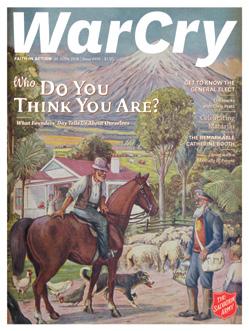

In those days, women couldn’t talk in church, but Catherine was one of the first women to preach— she became so famous, that the only woman more famous than her was Queen Victoria.
More than 35,000 people attended William’s funeral when he died.
Have you ever seen a picture of William and Catherine Booth, who started The Salvation Army over 150 years ago? William has a big hairy beard, and Catherine wears a funny-looking bonnet—that’s because fashions were very different in those days. But, even during their own time, the Booths were radicals and rebels!
William grew up in poverty, and began working at the age of 14 to help support his family. When he was 15, he came to know Jesus, and prayed that ‘God should have all of William Booth!’
Catherine made her commitment to follow Jesus when she was 16. They both loved God. William and Catherine got married and had nine children!
They wanted to share the love of God with the poorest people. So they started helping people who lived in slums. They gave people homes, fed people, helped them get jobs, found missing people, helped them stop drinking alcohol … and did all sorts of other things to help all types of people. They did it because they wanted people to have a relationship with Jesus—that is why they called themselves The Salvation Army! They became world famous because of the help they gave the poor. And we, as The Salvation Army, are still helping people and sharing Jesus with people today.
Lord, I give all of myself to you. Please use me to help others. Amen.
… offer each other a helping hand. Galatians 6:2 CEV
Did you know? Can you crack the code? WHILE LITTLE CHILDREN GO HUNGRY , AS THEY DO NOW , I ' LL FIGHT , . . , A B C D E F G H I J K L M N O P Q R S T U V W X Y Z A B C D E F G H I J K L M U V W X Y Z N O P Q R S T KEY Spot 10 differences Reprinted from 30 June 2018 01 OCTOBER 2022 WarCry 23
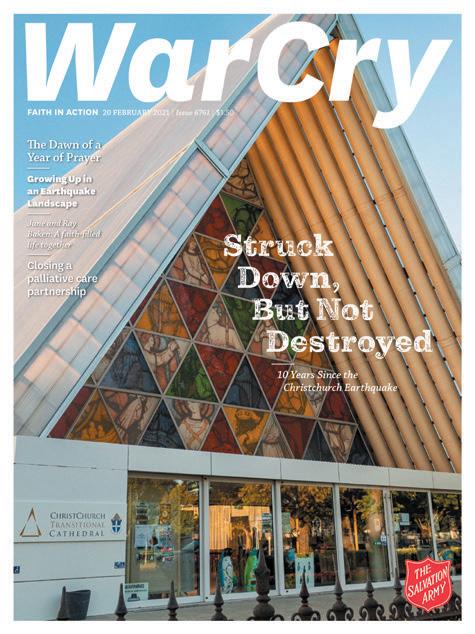
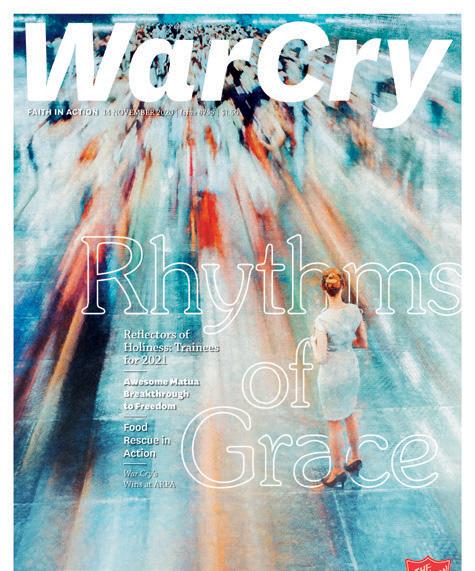

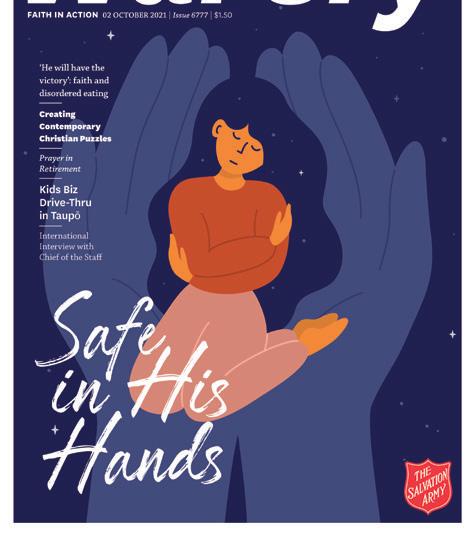












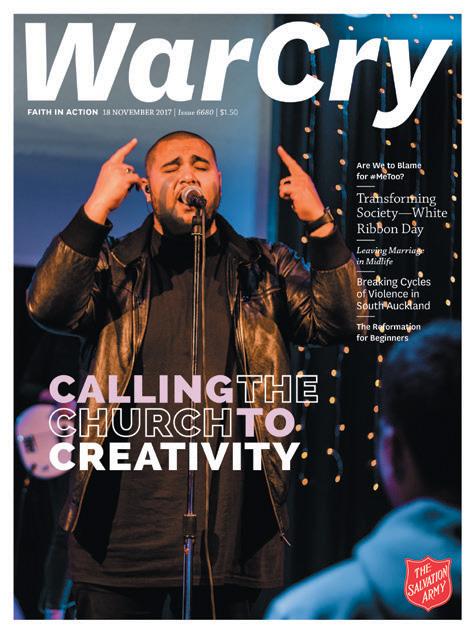
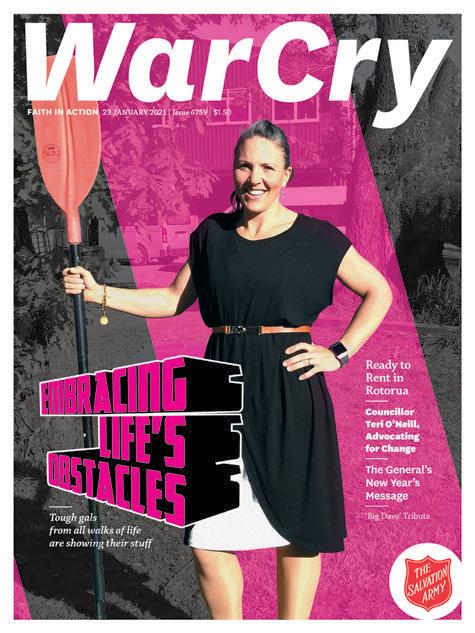


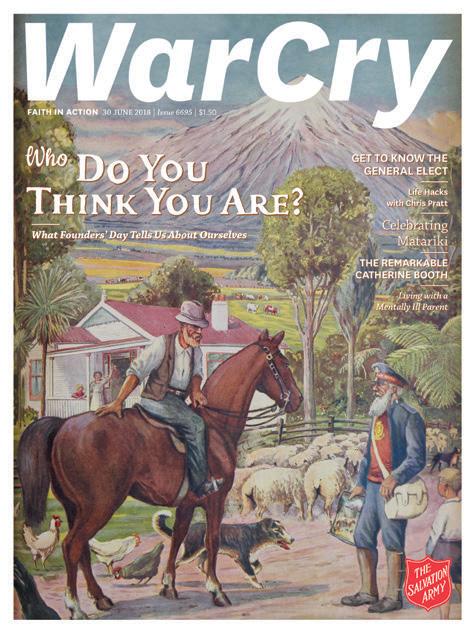




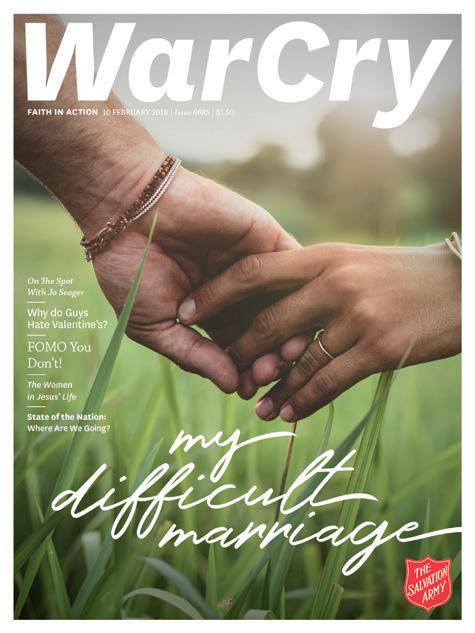


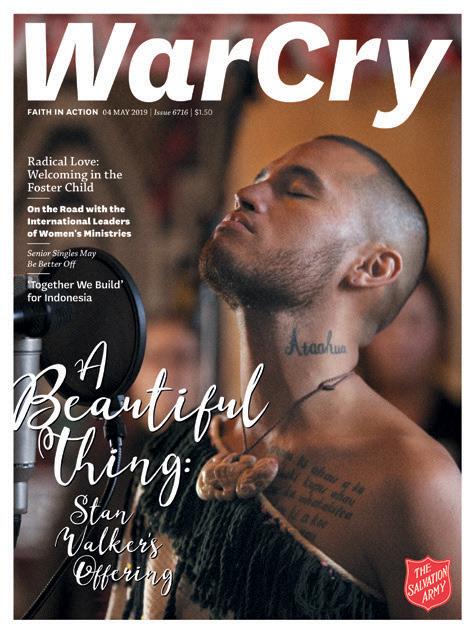

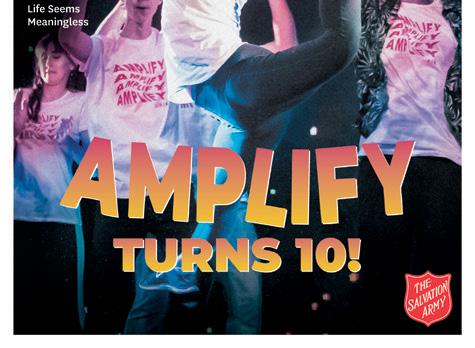


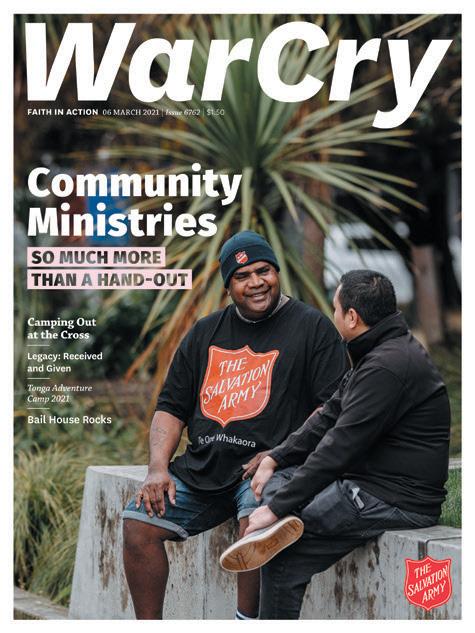


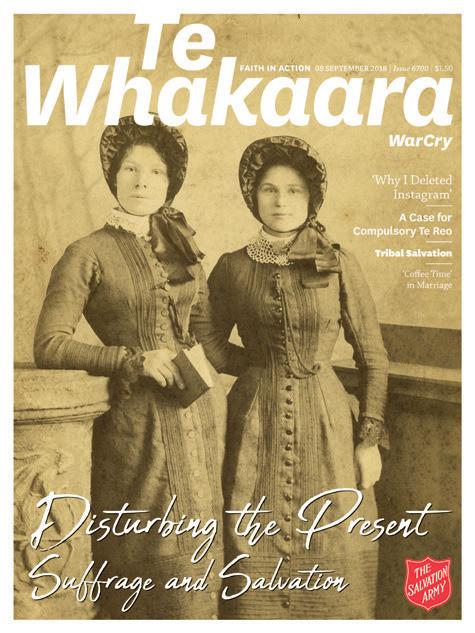
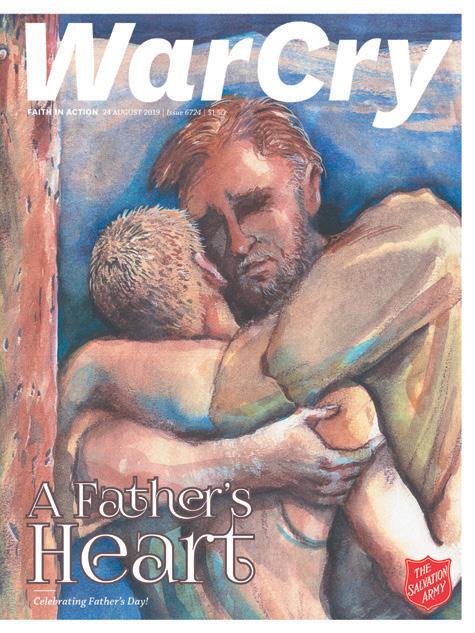
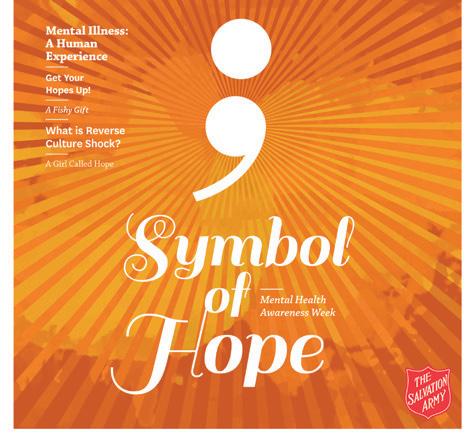







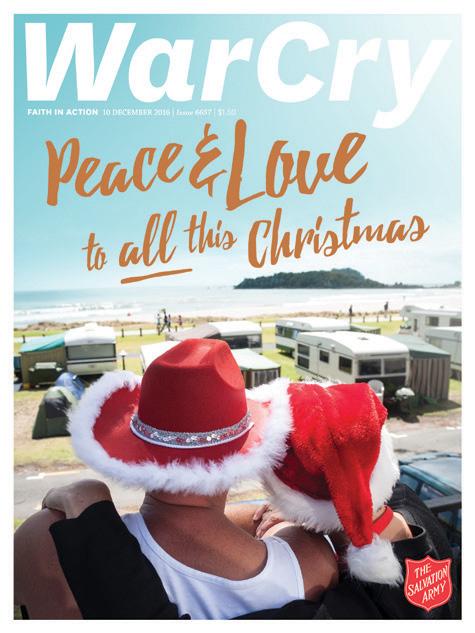
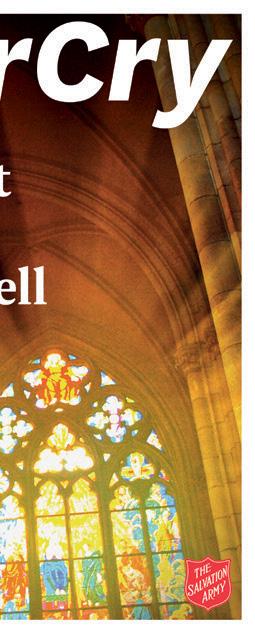
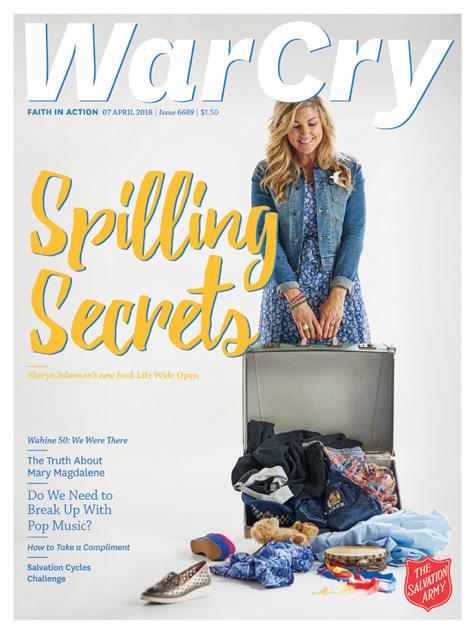
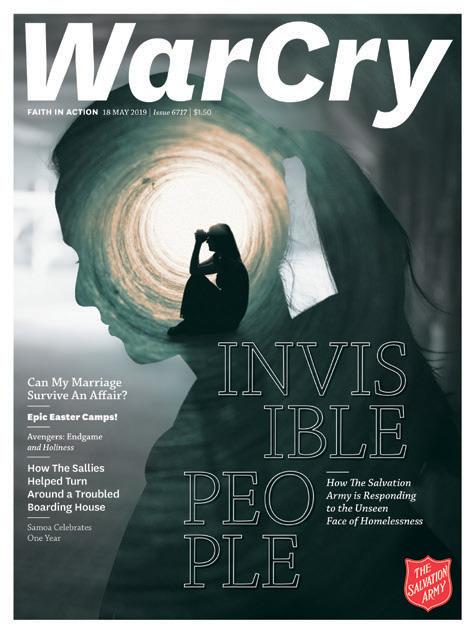
STEPHEN MOLEN IS DOING THINGS DIFFERENTLY Former BMAC WorkerTakeson AustralianSpartan e Secrets of Sisterhood CAN YOU MISS YOUR CALLING? OvercomingPower StrugglesWithYourTeen JUNE |Issue |$1.50



